#even the way one was introduced and how other characters perceived was something specific I thought of too
Text
i know a lot of people talk about the Cupid Scene as not being great as Nico's coming out story (which i think is a complex matter but that's a rant for another day), but I personally find it way more compelling if it's just not Nico's coming out story at all - it's the beginning of Jason's.
Because it doesn't really work or make sense to be Nico's, right? It's not Nico's pov. Nico doesn't have a POV at all in this book. And in House of Hades, the Cupid Scene is one of the first major things Nico gets to do right out of the box jar. Why introduce a character, have him be outed as gay, lead the crew around, and then leave to go travel with someone else all in one book where he's not even a POV? It's also contrary to the way Nico generally functions as a character - he's either exposition, dues ex machina, or damsel in distress. He's kind of a damsel here, but ultimately he doesn't need anyone else to save him - or even be there. He handles it on his own. Jason is mostly just a witness.
But, if you view the Cupid Scene as being about Jason, it narratively fits a lot more; Jason at this point is dating Piper, and they're three books deep into their relationship. TLH they start dating and are relatively happy with it and where they are. SoN is a skip but we know they're happily dating during that time, and then Mark of Athena we get a slight shift. Jason and Piper see Percy and Annabeth and go "Oh! They're perfect. Their relationship is perfect. We could be happier if we were more like them." Piper and Jason are also both characters who go through an identity turmoil in general - particularly about how both of them want to be perceived by others and who they are as people. The things they identify with - their parents, their heritages, etc etc. Their orientations. Piper's get more focus earlier in HoO, and Jason gets more later.
The Cupid Scene is from Jason's POV, in a book where he is beginning to struggle with his identity and what people expect from him - particularly him not feeling like he perfectly fits with "either camp." He's too "Greek" to be "Roman" but too "Roman" to be "Greek." He's not quite one or the other. He doesn't meet the expectations either has for him. (This is bi-coding, if you couldn't tell. Just replace "Greek" and "Roman" with "Straight" and "Gay.") It starts with Cupid addressing Jason first, before Nico, very directly - asking him if he's so sure he's happy in his relationship? Does he really think it's perfect? Even Favonius very pointedly asks him if he really forget that guys can date guys? Do you have some internalized bias around that, Jason? Hm? Heck, they're both specifically in their Roman forms, not Greek. Why would they appear in their Roman forms if they're there for a Greek demigod? And very notably, they have this exchange:
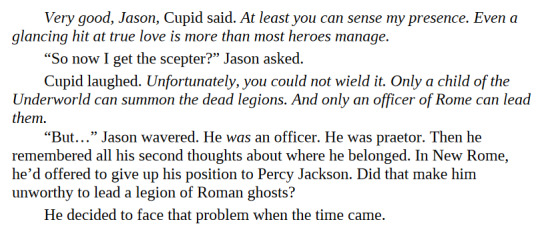
(remember what I said about the bi-coding with Jason's Greek/Roman identity crisis? I don't think it's coincidence that this so pointedly comes up during the Cupid scene.)
Favonius' introduction to the Cupid scene sets up Nico's portion of it, but Cupid almost exclusively speaks to Jason for the first half of it. Then Nico steps in. He diverts the conversation away from Jason and focuses the attention onto him. Nico's the one Cupid wants, he insists, not Jason. He's the target, not Jason. This is very in line with Nico's character - practically one of his core character traits is he trusts and starts caring about people very quickly, probably quicker than he should or even wants to, and will put himself in harm's way to prevent others from being hurt. The Cupid Scene isn't the start of Nico's coming out story - Nico already knows he's gay. He has no internal doubts about that. He's known it for awhile. He's just in the closet. And he starts coming out of his own free will in the next book, first to Reyna and Coach. The Cupid Scene is Nico recognizing that Favonius and Cupid are pushing Jason for something he's not ready for and hasn't figured out yet, but something Nico has and just hasn't said out loud yet. The Cupid Scene is Nico taking the proverbial bullet/literal arrow for Jason (Jason consistently describes the arrows as whizzing by him before striking near Nico, interestingly) and being outed so Jason isn't. And that presents Jason with the path to begin questioning his identity further. (Jason also then directly compares Cupid to Aphrodite, specifically her Greek form, which also ties into Jason's greek/roman stuff.)
And I don't think it's coincidence that Jason and Nico mirror each other so much, and that their arcs in HoH are so intertwined. The Cupid Scene functionally, on a meta level, establishes an explicitly queer character to parallel Jason and for him to bounce off of during his own arc. (And, also on a meta level, establishes to the audience to be sympathetic to queer struggles, with Jason's arc then proceeding to be a queer-coded struggle.) Jason is presented as having this strange level of isolation from how others perceive him in a positive way/the expectations people have of him that wraps around to something akin to Nico's ostracization as being an outsider and atypical demigod in general. Nico is a rouge - he explicitly expresses how he feels like he doesn't fit in at either camp (something he expresses explicitly during the Cupid Scene, mirroring Jason's simultaneous questioning his own place at Camp Jupiter) and a core part of his character is that he does function outside the rules and expectations of both camps. He operates on an entirely different realm to them. If the camps are an expectation of normative concepts of acceptable relationships, Nico is outside of that. And he recognizes that he operates outside of that and will never fully fit into the mold either expect of him, and he recognizes he doesn't need to fit in, even if he theoretically could force himself to fit that mold. Jason, meanwhile, is still locked within those boundaries, and grappling with this idea of how he can exist between them.
Nico hands Jason a goblet of poison and says "how much do you trust me?" and it's Nico challenging Jason to take his own advice about trusting others about their identities, and almost immediately after that Jason gives up his praetor title to Frank. Jason's Greek/Roman arc is directly tied to Nico and the Cupid scene. BoO ends with Jason asking Nico to stay at CHB so they can hang out that summer. By TOA, we learn that Nico has started dating and is staying at CHB (is exploring the niche of expected and socially accepted relationships) while Jason has broken up with Piper and is living away from both camps (rejecting hetero/allonormative expectations), still struggling with his own identity. They functionally swap places. And that's fascinating.
Anyways i think about Jason's bi-coding a lot.
#pjo#riordanverse#jason grace#nico di angelo#hoo#heroes of olympus#meta#analysis#long post //#HAPPY PRIDE MONTH. JASON BI-CODING MINI-ESSAY BE UPON YE.
197 notes
·
View notes
Text
It sucks for some big media thing to incidentally have an idea you also had, but never posted anywhere.
Because now if you do anything with it people will go "omg this is like [blank] ! I can see you were inspired by it !"
And I'll say "no actually" and they'll be like whatever, but in the back of their mind they'll think I'm lying.
I guess the positive thing is that the whole time I thought maybe it was stupid, but actually it seems like everyone liked it and thought it was cool. In a way you made something people clearly enjoyed.
#so many things ...#I recently watched something and two characters everyone loved basically were the same idea as an oc I had#even the way one was introduced and how other characters perceived was something specific I thought of too#.......#dang ...#if I officially posted that idea in a more well written way I would have seemed so clever#I technically do have something written with a date on it but it's vague because I wrote it quick#plus I privated it after reblogging to a throwaway blog and dec#*deleted from here#like I just want it on the record that I had the idea on my own and not inspired by anything else pre-existing#I'm not even going to say what because it's just so specific and I'm upset at that
4 notes
·
View notes
Text
I've just rewatched Urusei Yatsura: Only You, and now I have the need to gush about it. Please, bear with me.
Personally, I am completely blown away by how well they set up everything despite the movie being completely unrelated to the original manga. Elle as a character stands out in particular.
The way she is set up as the perfect Foil or, more accurately, Evil Counterpart for Lum has me obsessed.

Both girls are members of alien royalty and downright gorgeous, to the point of having countless admirers. They're also two girls who became interested in Ataru after losing a game of tag against him.
But that's where the similarities end.
Even their introductions are as similar as they are different. They both first appear playing a game of tag with Ataru, and in both cases he had no idea what he was getting into—with Lum he didn't know winning against her would lead to accidentally proposing to her, and with Elle he didn't know the chaos that would unfold for stepping on her shadow.

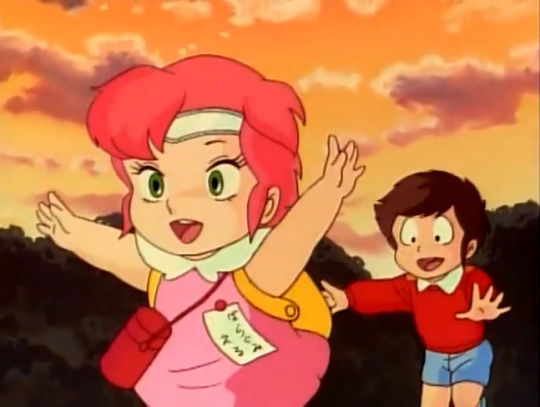
The differences start when we take into account how Lum and Elle were perceived at first, especially by Ataru. Because while Lum was originally an antagonist, both in and out-of-universe, as the representative of an invasive force and then as a nuisance on a more personal level for him, Elle was presented in-universe as a benevolent ruler and ally of Ataru. But the truth about both is actually much more complex and, frankly, quite the opposite to what meets the eye.
For all her flaws, Lum is actually quite open about them, never trying to hide them or present herself as better than she actually is. And her relationships with both Rei and Ataru show that, no matter how many admirers she might have, her heart will only belong to one person at a time.

She was also introduced as a forced to be reckoned with from the get-go, thanks to her ability to fly and generate electric shocks. Not to mention, the fact that she's based on the Japanese Oni also established her as captivating but dangerous. Which is something reflected in her iconic tiger stripe bikini and go-go boots.

Elle and her people, on the other hand, are clearly meant to represent a rose. In fact, when describing her, a certain expression comes to mind: every rose has its thorns.
Because Elle is as dangerous as she is beautiful.
Unlike Lum's devotion to Ataru, Elle spent the eleven years they were apart collecting men and refusing to let go of their love in the most horrifying way possible, far exceeding Lum's own possessiveness. And when they finally did meet again, she did not hesitate to try and hide her more unsavoury qualities from him. Heck, the main reason her true nature was discovered was because she couldn't help herself from freezing Mendo even though Ataru was already hers!

Her appearance also serves to illustrate how she's not as good as she presents herself to be. Aside from the obvious choice of white and red to highlight her hidden villainy, there's also the fact that whereas Lum's skimpy outfit draws attention to a more seductive side (which was gradually downplayed once she became the female lead), Elle's is deceptively modest in comparison. She wears a red and white leotard, boots, and her body is almost always covered by a white cloak. Yet she is far more depraved than Lum (and even Ataru!) will ever be.
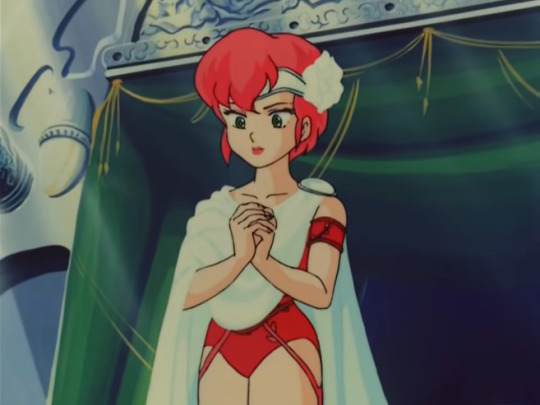
I would also like to point out how both Lum and Elle are not to be trifled with in different ways. As mentioned above, Lum relies more on her natural abilities than on her planet's military power and resources to deal with her problems. Elle, on the other hand, was never shown to have any special abilities beyond being indescribably beautiful. At first glance, this is another reason why she would seem a "safer" choice than Lum...Until we remember what she lacks in special powers she more than makes up for in military forces she will not hesitate to sic on her enemies at the slightest provocation.
And finally, there's also how the two of them have a specific term of endearment for Ataru. While he's Lum's "darling", in the original Japanese he is Elle's "honey".
(On a side note, I also really love the fact that a planet based after a rose uses insect-like hovercrafts.)
Given the magnificent job the team behind this movie did, it's no wonder this was Takahashi's favourite Urusei Yatsura film. It's simply phenomenal.
#urusei yatsura#urusei yatsura analysis#uy analysis#only you#urusei yatsura: only you#movie 1#ataru moroboshi#lum#lum the invader#elle de rosenbach#babara#rose#rumiko takahashi#shutaro mendo
50 notes
·
View notes
Text
.
Endlessly weird to me that people blame Pabu, the island and the episode, for somehow ruining the Batch.
I feel a way about this because Pabu is a) introduced to the group by unambiguously dark-skinned human characters and b) a refugee settlement. So to place the blame for the 'softening' or 'loss of coolness' of the show on that is really ugly looking. Like it just fucking is, sorry not sorry.
Acting as if without Pabu, Hunter super totally woulda been all in on rescuing Crosshair, is to pretend like the entire rest of S1 and 2 didn't happen. He was crushed by what he perceived as a complete loss of Crosshair at the end of S1 and has plainly spent a year telling himself to accept it. You can swap out Pabu with any one of a hundred other locations and the result is the same: Hunter isn't convinced Crosshair wants to come back with them, feels just as abandoned as Crosshair does. (Whether or not this is fair for either of them is a wholly different topic.)
None of that is about Pabu. Pabu is simply the place they come across--brought there by a fellow refugee who understands a need for solace and safety, even briefly--which reveals to them, like Safa Toma did for Tech specifically, that their lives CAN be something else. If you don't find that particularly interesting narratively, okay, but to blame Pabu is really a stretch. (Let's not forget, Phee is not about settling on Pabu either. She calls it a 'home away from home' for a reason. So she's not suggesting it as a forever place as it's not even that for her.)
Anyways. Kinda exhausted with this idea that 'Pabu' is somehow at fault for making the Batch not adventurous or heroic, as if any of them would never again leave the planet for a romp. Where does this weird ass idea come from, they have a spaceship! They can leave and come back at will!! Hunter being depressed and in his emotions about Tech being taken as some sort of 'because Pabu is an option' thing is weird to me. He coulda said Kashyyk. He could've said any number of other places. Pabu was just the place they were currently safest on.
Real over fandom not wanting narratives to play out, for characters to change and grow and become. That's how stories work.
#fandom salt#I should stop reading twitter and reddit lol#I fault no one for wanting more of Batch Adventures#especially during say the war#and for being disappointed that's not what this is#but it was clear from Aftermath#this would be a show about surviving a fascist regime#and that's not always gonna be about soldiering and resistance#sometimes it's just about surviving#even when you ARE a soldier and a commando#in the face of annihiliation survival is victory etc
34 notes
·
View notes
Note
hello, how are you?
I have a question regarding andorian humor, what is it like? Is it subtle? Is it a play on words like humans do sometimes?
Also how similar and different are humans and andorians philosophy wise?
Thank you for answering, have a good day/evening
Hi! I'm fine, thank you! I hope you're doing well, too! <3
Andorian-specific humour is a subtle thing, relying more on tricks of grammar and homophones/homographs than anything else, though Andorians can and will find quite a lot of different things amusing across multiple cultures.
Specifically, Andorii has some interesting nuances with propositional grammars. By definition, a propositional statement is one that must be solved or proven to be true or untrue. In Andorii, the grammars surrounding that can sometimes imply that something is both true and false at the same time, which Andorians generally find hilarious. The more profound or important the statement, the more hilarious the duality is. Sadly, these jokes aren't usually very funny to non-Andorians, unless they happen to be intimately familiar with Andorii and its quirks.
A classic play, which describes a time of political and social upheaval following the death of one Emperor and the ascension of another, is full of these propositional statements, including a famous scene where two different characters are caught in a loop where both are insisting "The Emperor is dead!" and also saying, at the same time, "The Emperor is not dead!" Each character misunderstands the other despite repeated attempts at clarification with yet more propositional statements, which only serves to anger both sides until it devolves into a very undignified brawl just outside the Emperor's chambers. Meanwhile, the staff, guards, and servants awaiting orders are hopelessly confused, and the Heir Apparent has started drinking. When asked why by an outraged minister, the Heir Apparent cheerfully responds, "Because the Emperor is (not) dead!"
Andorians enjoy plays on words and clever puns as an extension of that, and even flat jokes can go over pretty well with Andorians, but it's not universal. Much like how not every Human enjoys slapstick humour, not every Andorian is going to find these sort of jokes entertaining. Your mileage can and will vary!
As for Andorian philosophy, Andorians on the whole tend to favour more pragmatic approaches to things, but their profound love of music and art betrays a society with a deeply poetic heart. It could be said that Andorians don't have distinct schools of philosophy so much as a continuous, woven narrative of ideas that are heavily intertwined. The collective philosophic discourse constantly evolves with each new idea introduced, argued, and successfully defended. Old ideas are regularly reviewed with through the lens of each new perspective. Not all of these philosophies are in agreement with one another, of course. Especially discordant philosophical ideas are referred to as 'snarls' or 'snags' in the weave, and they are generally accepted and even welcomed by society at large. Andorians don't shy away from difficulty and hardship, and ideas which challenge their way of thinking and perceiving the world around them are greeted with cool analysis and careful thought, albeit sometimes only after a few kneejerk responses stemming from traditional social mores. To outsiders, the reception may seem cold, but to Andorians it is the only sensible way to proceed. Once a new idea, or set of ideas, has been dissected, examined, stress-tested in vigorous debate, and successfully defended, it is absorbed into the weave. Anything which fails this process is summarily ignored.
Very, very rarely, the development of a particularly disruptive or destructive philosophy will cause significant upheaval in the broader community and draw the ire of the Emperor. Remember that Andorians are extremely community oriented and regulate nearly everything. To receive official censure from on high is as good as social suicide - never mind what it does to one's career. It effectively renders a person toxic, and while there are certainly rebellious individuals who don't much care for what the Emperor does or says, there are many, many more who are vastly more concerned with how their behaviour affects their families. More often than not, in these cases - which I must stress are very rare indeed - exile is the only option the censured individuals feel they have left.
Thanks for the ask! I hope it helped!
#star trek#andorian#andorians#emigre by indignantlemur#headcanon#Andorian Humour#Andorian philosophy
8 notes
·
View notes
Text
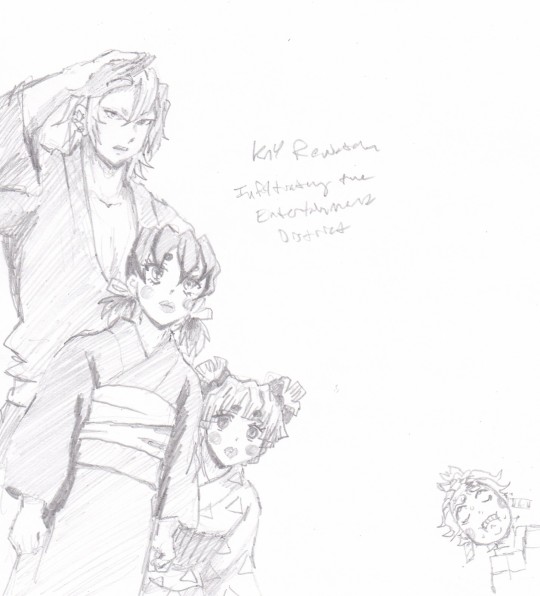
Things that ran through my head while watching this episode:
--Something I love about Uzui is that he strikes us as an extreme narcissist or somebody who just does random stuff and dramatic poses, but you can't even place him in that shallow of a box. He's a character who is hard to place at first because of his flamboyance and unconventional style, and part of the difficulty in making some gut decision about his character right away is because he defies stereotype. In every scene we get with Uzui, we dig deeper and deeper into what we erroneously might had assumed was a shallow box to place him in, but the box keeps going deeper and deeper--and the best part is, none of it is a front. What you see is indeed what you get.
--A friend who knows me really well once called me an Uzui type. I was shook. Of all the Hashira, he was the one I had the least desire to emulate (I strive most to give off Shinobu vibes when I'm at work), but then when I remembered this scene when he introduces himself, I recalled, "wait, I have indeed struck that pose." And if you catch me leading a nerdy tour group, yes, that's me. Painfully so. I promise I've never punched anyone for not following directions, though.
--Speaking of that same friend (whom I dragged into watching KnY), this episode has personal signficance to me because it aired when we had our first reunion in years, and not even an hour had passed before she underwent a small tragedy. It had the perfect timing for airing after she'd made some fragile peace with the situation, and it had us laughing and laughing to nurse away the pain. Could not had asked for better timing.
--I want that painting of The God of Festivities lording over the Kamaboko boys as a wallpaper for my computer. I love that while Zenitsu is constantly Tsukkomi-ing the others in his head for how more and more ridiculous they all are, Uzui just does it outloud straight to Inosuke's face. Uzui and Zenitsu are like two same ends of a magnet, repelling each other because they are the same in so many ways. I would like to see that grow to have enough of a friendship someday that they could talk about how they perceive other people's sounds and stuff like that, but I also find it so unlikely that they'd ever reach that contemplative level of conversation any time soon.
--That's so cute that Sumi & Naho are both clinging to Aoi. They're so relieved to keep her!
--Some of my favorite filler in this whole anime is the scene of Uzui and the boys checking out Yoshiwara. Not only does it establish the setting, but the boys are adorable and in-character, it gives Tanjiro (and the audience) a clear understanding of how this town works, and frankly, it's hilarious and adorable. Uzui has already had it with these boys before they start ticking him off even more while he's trying to explain the mission details.
--Makio, Hinatsuru, and Suma really are capable, as it was after they entered that they were able to narrow the suspicious locations down to three establishments. That makes me suspect that they slipped around more like maids from place to place, or just as Kunoichi who could blend in, before specifically infiltrating those targets as women who can be more entwined with the inner-workings. But the two things that get me are that they became Oiran so fast (what remarkable talents did they show off? Were they sold as being top property from other flower districts outside of Tokyo or something??? How long were they on this mission?? I have to assume being Oiran (and therefore more prohibitively expensive) made them less occupied by taking common customers), but also, WHY WERE THEY USING THEIR REAL NAMES????
--I love the off-key violins played in Sumiko's background
--Speaking of BGM, the one played behind Zenko as the screen fades to black and we get Zenitsu's angry thoughts towards Uzui is similar to the BGM played as his inner-space was infiltrated on the train and he started going gardener on the guy.
--Inoko picking up the ends of the kimono to walk faster, hahahahaha
--Again, loving the set-up to the Yoshiwara setting, from Koinatsu's footsteps to the dialect used by the yarite who bought Inoko--she feels like someone who has totally been doing this since the Edo period, though that might be a stretch. Also, after Inoko is dragged down the hall, there's the girl carrying a tray of food who stares after her a long time, then finally blinks. I love that Ufotable takes their time with things like this. Also!! I love that Neesan who sees promise in Zenko.
--According to Kimetsu Radio commentary, Hanae-san and the others were directed against doing falsetto voices so as to keep the boys recognizable (especially since it is harped over and over again how the three of them were chosen for how they'd be distinctive against each other). The directions for Sumiko were to do it as a "refreshing" tone of the Tanjiro voice.
--This is making me think back to how much fun I had with the activities at the TOEI movie studio's event in their Yoshiwara set, where you could carrying stuff like Sumiko or pose with the shamisen like Zenko. The shamisen kept getting broken. XD I posted photos here, but unfortunately what I thought would be a crafty way of getting way more than 10 photos on a single post backfired and they're only reasonably visible on mobile. Sigh.)
--Awww, Sumiko kept the candy from Koinatsu-oiran! If Tanjiro slipped that in his sleeve, I wonder what he did with that later? I'll bet his first thought was wanting to let Nezuko taste it. Also, I didn't buy it, but I liked that this was a piece of merchandise available at a traveling Ufotable gallery.
--So that outer layer Warabihime-oiran wears has a black pattern I can't recognize, but it reminds me of zoomed-in snake scales. It looks even more like that in the manga. Gyutaro reference!?!??!
--This low-lighting is doing all kinds of favors for Inoko's delicate features and bright eyes.
--I love the imagery of the ending theme, especially that tender shot of the Kamuro from the various Okiya being out in the sunshine, laughing and playing together, simply as the young girls they are. It's so freeing, especially considering the life they've been sold into and the harsher work which awaits them in the future. The beautiful oddity of those bolts of kimono fabric flying around provides such a moment of respite for everyone in that den of darkness.
58 notes
·
View notes
Text
ouattober2023 Day 1: Fav character
Ahem, to the shock of everybody who followed me for like a week the answer to this is Ruby Lucas aka Red. And let me tell you why if this adorkable smile with a dash of self-consciousness isn't enough:

Now I grew up with fairy-tales and got introduced to the concept of different takes on well-known characters early on. OUaT sounded fun with this very specific background to it (which wasn't even heavy in S1 compared to later lol). In that setting Little Red Riding Hood stood out to me and while I was falling in love with all the ladies, I was interested in her story, because there was the most freedom to begin with.
With episode 4 The Price of Gold that interest grew, because I can get behind someone who is perceived a specific way (oversexualized, a bit naive) and then sticks up for others facing judgment. She's friendly, kind, helpful - it was clear there is some fun tragic in her past.
To be honest, even after Graham died, I somewhat expected for the Huntsman to show up again should we ever get into Red Riding Hood's backstory. I mean, there is a huntsman in there. And we saw Snow and Red being friends, so to me that felt like the natural connection (plus he is the one with a wolf-motif as well). The first sursprising part in Red-Handed to me was that there was no Huntsman. But well, if I didn't like Ruby enough before, with that episode I was done for. Ruby has this somewhat bubbly persona, yet Red's past is capital T tragic. In a world where they keep telling me that True Love is a thing and it's important, we get a girl who eats her boyfriend. In a non fun and very bloody way. Wow.
I was excited when Meghan Ory was upgraded for S2 and then... well... I do not understand how she became part of The Pile of Wasted Potential. I know there are different reasons for different characters, but that's the worst part about this show for me. So many amazing possibilities and somehow the writers often went the most boring route and characters got tossed aside left and right. Including Red. Yes, okay, the superspeed was a mistake. Never give your hero characters superspeed, it demands a certain amount of stupidity to not be overpowered. But the hero group could use some wolf muscle.
Because of her own (accidentally) murderous past, Ruby should be a very compassionate person. Something of use in a show where villains get redeemed like it's a monthly quota to fill. Funnily enough she's even a good mirror to one of the main characters, Regina Mills (murder, dead mother, lost love, it's a thing, trust me).
Also a few nights a month she is the most perfect cuddle buddy. What more do I need in a fav? Can rip people to shreds, but also keep you warm during snowy nights. A+
#ouattober2023#Ruby Lucas#OUaT#I'm sorry I'm late to the party because I didn't know!!#I can't make gifs or fancy art but let me pour my heart out in bite-sized bits#(I have many many thoughts about Ruby Lucas and also lots of ideas how she could have fit into the storyline in meaningful ways)#when she left I kept watching because Regina Mills is a close second fav so I still had fun...
19 notes
·
View notes
Text
Each of the three new staff have made it a significant point in their narration to explain how they “see the Hotel differently” than the guests do. Differently than even the staff do, which brings on a whole host of very interesting implications.
I want to bring up the idea of contrasting ‘light’ and ‘dark,’ since that comes up a lot in relation to the Hotel herself. She is, herself, darkness. The natural state of the universe. Not quite nothingness, but the specific, cold, absence of life. The Hotel, from lobby to elevators to stairs and hallways to rooms, is death. Those inside the Hotel are lights, stars glimmering in Her vast darkness.
(On an unrelated note, it’s my personal view that when the Staff describe Madam Hotel as having eyes like starlight, it’s them catching glimpses of her full form. Condensed infinity of hotel.)
We know from the finale of Season 2 that the Hotel herself tried to “put out” those “three lights of [her] own making” and couldn’t do so without nearly unraveling herself. She also refers to the guests as lights, both in that episode and later on when we get narration from her, such as in 4.8:
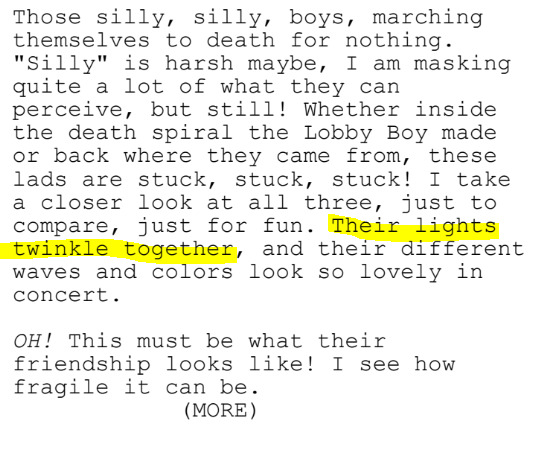

Now aside from me losing my mind now at how much you could parallel the three guests of that episode to the first three staff and not realizing this before...
We also know that the early staff don’t see the Hotel the same way the guests do. Often, they’ll comment on the guests seeing or reacting to things that aren’t within the staff’s perception. Things that can cause them to react and behave as if they were in a regular hotel up until the very end. The staff are aware that both their own, and the guests, perception can be shaped and warped by the Hotel’s whims. But still, the Hotel appears as a hotel to the first three staff.
The new gang has a decidedly different perspective. The Bellhop sees the Hotel as a massive amalgamation of meat and guts ( :-] ). The Concierge paints a picture of the Hotel’s structure as this....paper mache formality, as something that hides the true cosmic colors and shapes that underpin every part of the place. And the Auditor in the new ep introducing her refers constantly to darkness. The darkness from which they all come from, and which they will all return to.
The new staff are perceiving the Hotel as....herself, essentially.
That’s curious, because this set of staff is, at least as I understand it currently, fresh outta the oven. Created by Her as the result of the lead up and events of the Curtain arc.
This new set starts out with this...reverence towards the Hotel. This admiration and awe and wonder of Her. I wonder if this is because of their perception, or if it’s because they’re new.
There’s clear character development with our first set of staff, mostly because...Well, obviously. There’s no avoiding that. Admittedly, while I adore S1 very much, I don’t know how ‘canon’ their early characterization actually is since it seems to be around S2 that the series settles into itself.
But purely in-universe, I wonder if the reason the Hotel is bringing on these fresh employees now is because she’s noticed that the first three staff are becoming more human. More...like the guests. They first perceived themselves as part of a company structure (at least, the Owner did.) after all. Much less cosmic wonder, more powers that be in the sense of your vague, far away corporate overlord, y’know? And they grew to care for each other, to form bonds with one another despite starting out as infinite copies of a basic idea. Somehow, they found a way to persist. To become and individuate, not unlike the guests.
Buuuut, welllllll....What does that say, when the staff are just like the guests? How professional is that? We’ve got an operation to run here! And all this in-fighting and protectiveness and blah blah blah is getting. in. the. WAY! (Never mind that Madam Hotel was getting, in the way of them)
So, what to do? Can’t, er...fire them. Or rather, extinguish them. They may be more like the guests now, but they’re also her in a way. So integral that ridding herself of them would be unspooling herself. Her brute force punishments of S2 and the Curtain arc have only strengthened the old three’s resolve. The whole of S3 was both, I believe the staff’s origin and also end? and also another attempt from the Hotel Herself to get them to understand her. to understand their world. That worked....temporarily.
Maybe they need some encouragement! Some positive role models! Some good influences to rub off on them and get eeeeverybody on the right track again! And this time, let’s fix some of the old model’s problems while we’re at it. These three will get to see, from the start, what and how and why she is.
The only question remains, how will these new staff members change over time? What will happen if she loses control of them in the long run, too?
#the hotel podcast#also rereading the s2 finale transcript is. OOGH!#someone poke me to do a big hotel herself essay at some point#i could EASILY fill ten pages with my musings on her gkjshf#anyway to anyone who reads my long winded rambling abt this podcast:#genuinely thank u. means a lot#i hope i dont sound too insane lol#hotelpod analysis
28 notes
·
View notes
Text
I figured since it’s been a few days since I last talked about my Twst x digimon AU, I’d do that rn!
So, here are my reasons for why I chose which digimon for which character.
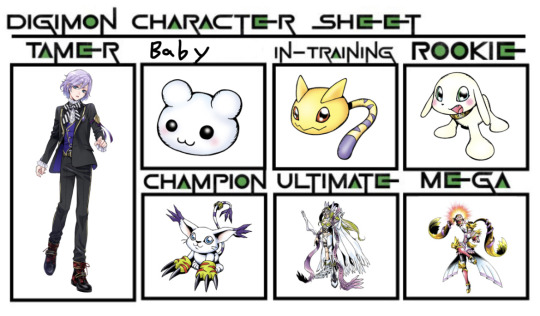
Starting off with Epel! Epel was one of the first lines I came up with. It started off with me remembering that Lovely Angemon existed, so I went to her page on Wikimon. Now, I don’t remember if I went to Wikimon specifically for this AU, but that’s what it ended up being. Anyway, I then clicked on Sala/Plotmon’s page bc, why not ig? And that’s when I realized that I thought that Salamon and Epel would look really good paired up together. So I decided on the line you see above.
So yes, at first it was about the aesthetic. However, when I started thinking about it, the more sense it made to me. Salamon is a really cute digimon, who doesn’t have that much control over its power which makes it seem weaker than it really is. And when you think about that along with how much Epel hates being perceived as ‘cute’ and/or ‘girly’ having that type of partner would be something he’s less than thrilled about.
Then there’s Gato/Tailmon. Gatomon is a champion level, and in the OG Adventure 1999 series, she’s introduced by beating up all of the digidestined’s champions. Now this is great, however Gatomon is still very small compared to other champions, and still very ‘cute’ looking. She could easily be mistaken for a rookie level (plus Gatomon is categorized as both Champion/Adult and Rookie/Child level, so…) now you’ve got an exceptionally powerful digimon (though one could argue that Gatomon’s strength in Adventure 1999 is bc of ✨trauma✨ but that’s neither here nor there) but is still very small and cute. Connections to Epel are fairly obvious, I feel.
Then we get to Angewomon. A very obviously Feminine digimon, and, I’ll be honest, the way I have the scene where Gatomon digivolves into Angewomon for the first time, Epel’s first thought isn’t about how feminine or pretty she is, but “wow, my partner’s so cool!” Or at least, something along those lines. Of course, I don’t know if that would how it would turn out if I actually made this into a story and not just random anecdotes about the AU, but I feel like that first thought would show off some of his character development in this AU.
Finally, with Lovely Angemon, it is mostly the same as the previous, however Epel seems to refer to himself using the word “lovely” more in the direct translation/JP than in the EN translation.
(I did have a picture of Epel referring to himself with the word “lovely” but my image was fucking up and only putting in the picture of Epel’s digimon line, so, like, look it up for yourself ig)
A final anecdote about this line is how it kinda parallels (if that’s the right word) another character in the AU. Because, you see, the Great Seven in this AU are all turned into digimon that the main cast meet throughout their journey. And the digimon I chose to represent the Fairest Queen is Lilith/Laylamon. Now if you don’t know, Lilithmon is very connected to the Gatomon line. As Lilithmon represents a sort of “dark version” to Ophanimon, one of Gatomon’s Mega levels. In Lilithmon’s Digimon reference book entry, it even states that “It is thought that it was originally the same kind of Digimon as Ophanimon, but it fell from heaven and eventually became known as the ‘Goddess of Darkness’” So while Epel’s line may end with Lovely Angemon, that doesn’t mean that there isn’t a strong connection between the two characters, which I find very fun!
Anyway, ig the tl;dr is that I choose the Sala/Gatomon line for the aesthetic, but I was actually being a genius.
(Anyway, since the pictures keep fucking up and showing the Epel Digimon Line instead, I’m just going to end it here and explain the rest later in a different post)
#twst#twisted wonderland#twst epel#twst x digimon#Digimon Twisted Wonderland#digitwst#digitwst Epel#digitwst Salamon
6 notes
·
View notes
Note
I really wanted to say something abt it, as you brought up how ppl seem to want Toga and Ochako to fight over Deku.
It reminds me of when some bkdks say that "If one of them was a girl, nobody would bat an eye and say that they are canon right away", and while i think that's true to some degree, i think things wouldn't change that much if Katsuki was the girl, specifically. At least, not when it comes to this group.
Bc, Kacchan is somehow controvertial over him being a schoolyard bully and insicure kid, and the fandom blowing it WAY out of proportion. I think that would happen the same way if he was a girl, but now added a much thicker layer of mysogyny.
Bc then they would most definitely pit him against Uraraka, just like they do to Toga, and be as horribly sexist as one can possibly be. Bc just like Toga, he wouldn't fit the perceived "perfectly sweet, wholesome submissive wife" role that they want Uraraka to be in so badly.
I'm saying this reminds me of what you said, bc this group, (made all basically of men), don't hate togachako and bkdk just bc they're homophobes, no, they actually hate any ship that have these two with other characters.
Bc they also have a twisted want for mha to insert in some harem shit between any girl Deku has a any interaction with so they can project onto him as the protagonist surrounded by women, and in the end be satisfied with seeing Uraraka become the pretty, submissive housewife bc that's her job as the nice main girl.
So if anyone else has a genuine shot with Deku or Uraraka, it breaks that illusion that this is what they are going to get, no matter what. And that's what they are used to getting.
Absolutely agree, Anon!
I feel like if Katsuki was a girl, there would be that group of people who would call her a bitch and "she and Izuku wouldn't work out" and definitely would view Katsuki as too "dominating" due to personality.
I hate this for several reasons because if you're shipping IzuOcha because you view Uraraka as the "perfect, submissive little wife" and that's it, you are not a true fan of her.
Like no one who is a genuine fan of her would look at her as just some "wife" for Midoriya because she's "meek and sweet".
First off, she's not "meek and submissive". Uraraka isn't a shy character. She's a lot more outgoing and social than Midoriya himself is. This is the same girl who even decided to do her internship with GUNHEAD, a Pro Hero named GUNHEAD.
Yes, she is a sweet soul. Yes, she is kind. But Uraraka isn't meant to be a girl that should be viewed as submissive because she is a nice girl. On Midoriya’s part, it's like saying he must be with her because "that's what a real man would do". He can't be with a guy, he can't have emotions. He can't cry. It's the only way some of these "fans" will actually like Midoriya. If he "gets his girl" at the end. Even though the story never was about them like that. Hell, if it was, Uraraka would have been introduced in the first episode and Midoriya would have some monologue about liking her or she is seen admiring him from afar behind some trees.
They don't care for his or Uraraka's characters like that.
Sexist and misogynistic, indeed!
Second, damn, can these kids like finish school first? We really need a timeskip where they're married? Like they can't beat the bad guys first?
Like I want a graduation timeskip! Ain't this story about how Midoriya and the others become great heroes? Last time I checked, marriage isn't needed for them to be good heroes. If it was a requirement, All Might would have been married.
And the harem thing? Ooooh, the amount of headaches I have probably gotten from going into certain tags on AO3 and here and seeing Midoriya being shipped with every single female character before I can get to the filter and exclude buttons.
I just can't sometimes, Anon.
I know a lot of Shonen and other genres in anime and any other media have certain tropes they use over and over, but sometimes it's nice to break away from said tropes.
Off topic kinda, but speaking of harems and girls, I love how in canon that they girls don't harbor romantic feelings over Midoriya and fight with each other. I also love that while they express Todoroki's pretty boy status, they don't fight over him either. They mention he's handsome and move on. Like I love that right there.
When some common tropes are taken and twisted into something a little more tolerable or feels not so played out.
#kiya answers#bnha#mha#boku no hero academia#my hero academia#uraraka ochaco#toga himiko#midoriya izuku
4 notes
·
View notes
Text

The climax of the story begins, though the writing has failed to give that effect. Maureen has lead Simon to a luxurious building because villains, aside from having cultured voices, like to do their dark magic in lofty settings.

CcLEaRrLyY.
→ It was designed to look like...

I so hate these filler words that mean nothing. These read as observations and information perceived by Simon without words like seemingly, apparently, or as if. If the information is observable by the character, i.e. Simon does not have eyes in the back of his head or anything, these words are useless and annoying, though, I admit, a stylistic choice as well.
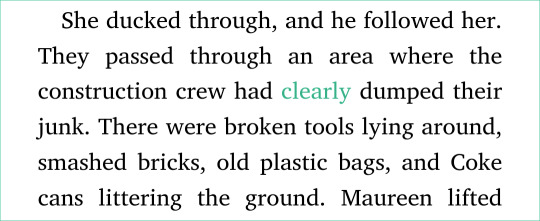
I will punch something.
→ They passed through an area where the construction crew had dumped their junk; there were broken tools lying around...
Simon and Maureen enter this magnificent building though an ornate lobby. In the lobby, there is a massive unlit chandelier that I swear to god is observed by each character that arrives in that building.
Cut to Isabelle and co. noticing Simon is gone and trying to find him.
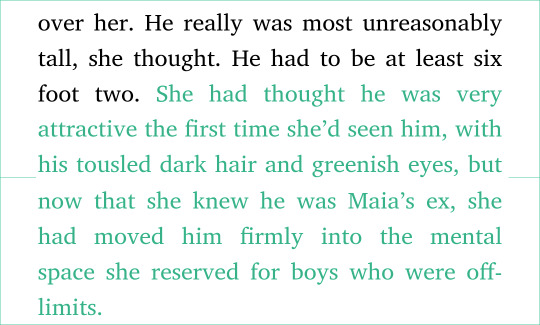
How courteous of Isabelle. The writing in this book is so insistent on hyping up Jordan’s appearance that it has spread everywhere. Every major character except for Jace think he is handsome and hot and bruh.
Alec joins the search party for Simon.

Not to be pedantic but on the previous page before they begin the search:
“He told me he was going to be right back. That was forty minutes ago. I figured he was going to the bathroom.”
😉
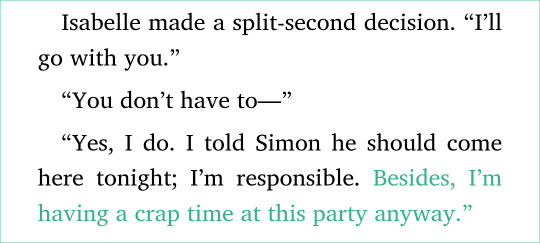
→ The party you were not invited to anyway. Be sure to send Luke and Jocelyn your regards.

→ From previous context on how Isabelle has behaved rather protectively over Maia, it’s rather evident from Isabelle’s behavior and doesn’t need such elaboration.
Isabelle thinks the tracksuit gang might have gotten Simon, so she, Maia, Jordan, and Alec decide to go and search Jordan and Simon’s apartment for clues on Simon’s whereabouts. And we cut back to Simon and Maureen who have arrived at a roof garden.
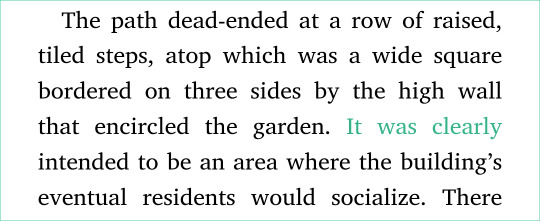
I will punch two things.

Did you know Simon is a vampire? Not that you could figure out how vampires experience the feeling of thread or come up with a metaphor or something other than what is often used for humans.
Simon is then faced with Lilith who takes a forever to introduce herself.
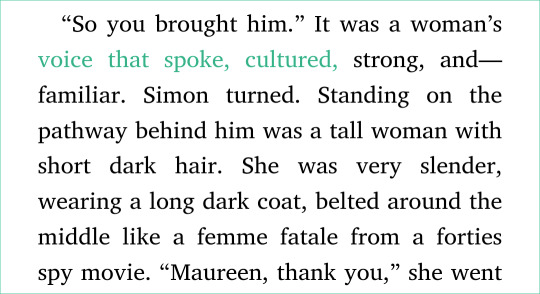
It is the cultured villain voice that returns. Shazam.
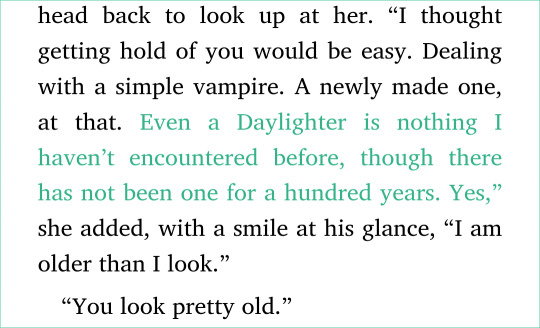
Does The Last Hours feature a Daylighter? Otherwise this seems like a waste.

The story goes for Biblical stories but refuses to touch upon the fact that a God apparently exists??
Lilith then explains the plot of the book to Simon.

→ Scrap this. It does not change anything in tonality.

This is the most ancient of demons, the very first of their kind, and what you do is write her doing these humanlike gestures. Lilith should be otherworldly, more supernatural than the supernatural things in existence, eons old and eons of experience, and not written like humans just shrugging.
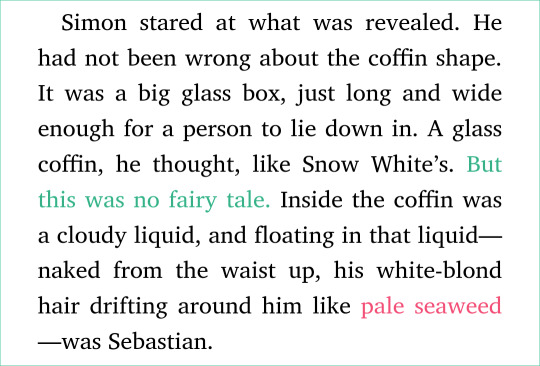
→ Useless sentence.
→ Seaweed is a word that is at least three times used to describe Sebastian’s floating hair. It is specific and weird enough to be used so many times. This is the first.
Cut back to the Investigation Team in Alphabet City.

→ Isabelle leaned around the doorway. Maia was standing on one side of the kitchen counter...
→ I will gouge Jordan’s eyes out.
Jordan and Maia talk about their past.
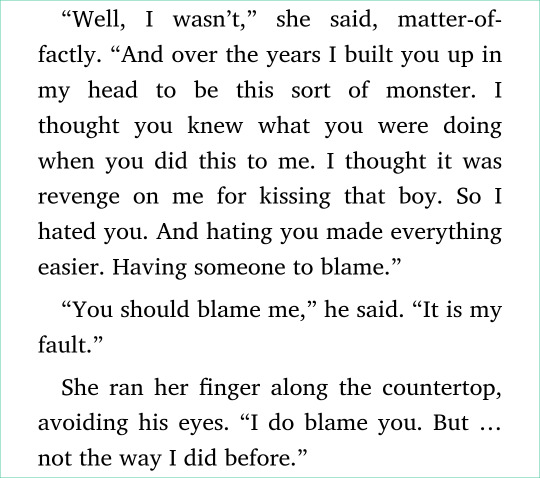
This would be all fine and dandy if it, and I say it once again, was about giving Maia closure. But no, it’s about her and Jordan getting back together.
Investigation Gang finds out the band promoter card Lilit gave Simon with an address on it, and leave to investigate it. And back to Simon.
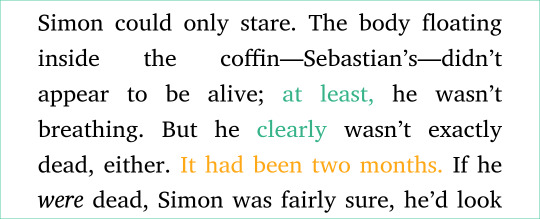
→ ...didn’t appear to be alive; he wasn’t breathing. But he wasn’t exactly dead, either. If he were dead, he’d look like he was in a lot worse shape than he did; it had been two months.

Are we prefacing Tessa?
Also, this is a bit late realization, but why didn’t the demon blood affect Jocelyn in any way but the angel blood she received gave her powers?

It’s great how even Lilith, the mother of demons, knows what Jace currently identifies as.

Lilith has been blabbering on how she was there all along and saved Sebastian to raise him from the dead, so I don’t get why she even bothers to interject herself with these useless questions, when she is going to tell it anyway.
→ It has not been revealed thus far in the series but how is the cup filled and what exactly is in it when the Ascendants drink from it?
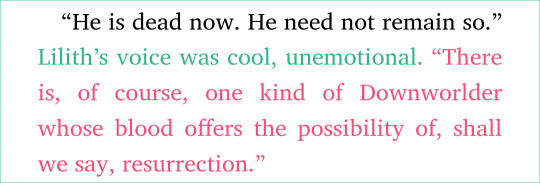
Two go-to Clare things
1. describe eyes and their color with current emotion.
2. describe villains voice and tone
→ It’s also strange that, Simon being such a special vampire, no one ever bothered to research the topic to figure out the extent to his powers.

It is never explained why Simon needs to bite Sebastian or drink his blood. Why can’t he just give his straight to Sebastian?
→ “A world without Sebastian in it is a better world...” Simon’s deliberation is obvious if the name itself was emphasized, so you wouldn’t need to tell that he emphasizes it.
Lilith then lays down the Old Laws of how resurrection work. Because one life was returned to the Light, one life must be returned to the Dark.

Repetitive.
Simon attempts to leave, but Lilith brings out her leverage. Jace appears, holding Clary hostage. Dun dun duuun.

But at least Simon, even during great duress, has the attention span to notice that the knife is, indeed, bone-handled. Because that should be the focus as well.
6 notes
·
View notes
Note
PLOT: shelby/lucy. anastasia/nero. elena/nero. raven/verity >:^)
shelby/lucy: doesn't make sense, compels me. i have no idea why i latched onto them as a couple bc they hardly interact one on one (other than shelby technically being the one who introduced her to the others?) and realistically shelby/laura or lucy/laura makes more sense if we're talking abt ships that have any kind of foundation in canon. However this is maybe exactly WHY it compels me. i think they have a lot in common tbh (difficult family relationships, attempted concealed identities). and while i find shelby super shippable with every core four member i can never really see any of those relationships working out in the long run for her (shelby/laura i always see as one sided/laura choosing otto, shelby/otto is a short lived teenage fling that has tons of chemistry but is also super tosxic for them both, and bloodline epilogue kind of confirmed my 'shelby and wing go on a 'break' post graduation and just never get back together' headcanon), whereas with lucy i think i can? like they have a good enough balance of similarities and differences (whereas shelby/otto are too similar and shelby/wing are too different for me). idk obviously in canon it could never work because lucy fucking DIED but it's fun to imagine aus where she didn't!
anastasia/nero: makes sense kinda, compels me. im so sorry mark walden i say this w all the love and respect in the world you CANNOT tell me you wrote those books not intending us to believe anastasia and nero hatefucked nasty. the whole bucharest thing is so deliciously vague like...idk what else couldve gone on. my more 'fun' nerostasia headcanons (eg that anastasia and elena were the twins, that anastasia/nero had some overlap with elena/nero) are definitely way out of the realm of canon though so i think i can't say it fully makes sense. anyway yes it compels the hell out of me they are my ants in a lab!!! i think i don't enjoy them on their own so much as i enjoy them as part of the rich tapestry of Fucked Up Furan Dynamics like the two are inextricable for me. but anyway yeah i think one of my fave fics ive ever written was that bucharest nerostasia fic. they really get my brain goin
elena/nero: makes sense, doesn't really compel me. makes sense because the whole romeo and juliet thing and also in the wider fanon saga of nero vs the furans it is objectively funny and very in character for nero to turn around and make his nemeses' baby sister into a teen mom. however while i am incredibly compelled by nero and the furans as a family, and am SUPER SUPER obsessed w elena on her own, them together specifically is not something i'm super interested in. elena is so so fascinating to me and always has been, but not because of her relationship w nero. i think it's fun to reflect on how nero perceives and elevates elena after her death, and it's fun to talk abt the consequences of their relationship, but the actual relationship itself devoid of any of the furan Drama? eh. just not something that particularly inspires me i don't think
raven/verity: makes sense, UNFORTUNATELY DOESNT COMPEL ME. to be clear when i say makes sense i mean in a hatefuck-y way. they were definitely homoerotically obsessed with each other even before raven murdered verity's sister. i wish wish WISH this was something that got my brain chugging because on paper it ticks all my boxes (messy hatesex, lesbians, assassins) but in practice it's just never been something i've gone 'wow i need to write/think abt this'. DONT GET ME WRONG I LOVE READING IT HINT HINT but i dont think i'll ever write for it
1 note
·
View note
Text
Concept: Masks, Trickery, and Truth
The idea I was working with when I started this project was about Truth, specifically how we perceive truths - especially when we think about people and personalities. I had previously been exploring the concept of Gender and our perceptions of them, both real and expected. This led me to Theatre and Acting and how gender roles are essentially an act.
I'd briefly made some scribbles of notes based on characters from Stranger Things. The first part of the 4th season had been released that day. The mind of an artist never stops! I have at least one sketchbook to hand at all times.
Out of the newer characters that were introduced in the 4th season, Henry Creel was the most intriguing. He was simultaneously fascinating and creepy. It was obvious to me that he couldn't possibly be as friendly and 'good' as he appeared. Perhaps that's because I'm suspicious of most people and things in general... That creepiness to him as a character was quite alluring, actually. That's probably a 'me' thing, too. I was always one of those people, even as a child. Perhaps it's that scary things are attractive and inviting if only for the promise and expectation that it's from a safe distance and, if fairytales and scary stories are to be trusted, the 'bad guy' is almost always punished accordingly eventually. Good conquers evil. or perhaps it's that belief that behind the Evil is some Good, that something of who they were Before remains locked waiting to be unearthed and remembered.
Scary things can be fun but only when we know it's not real. The creepiness is, in some ways, inviting. We have to know more, to understand them.
I saw the character of Henry Creel (and later, Vecna) in two distinct ways.
1) ‘Henry Creel’ is the ‘public’ face, the ‘acceptable’ face, which he adopted as a child in front of his peers and family members, and while in the laboratory under strict supervision from experts and scientists. Creel is essentially controlled and monitored, both by being watched and supervised by his peers, and by the insertion of technology that not only keeps track of where he is and presumably who he is with but also means he is unable to use his supernatural abilities. ‘Vecna’ is someone with supernatural powers - unlocked with the removal of the device in Creel’s neck - who has malevolent intentions of ‘reshaping’ the world. He uses his supernatural gifts to connect and control - and ultimately kill - people who have been traumatised by something in their life (none of it is shared trauma, they are different and individual experiences). ‘Vecna’ is the reality of who Henry Creel was supposed to become all along before being stopped in the development of his gifts by scientists and doctors. He becomes Vecna by removing the mask Henry Creel gave him and by being beaten in a fight with another person with supernatural powers.
2) Henry and Vecna are two halves of a whole person. They are both one and the same person, just different aspects. The Good and the Bad, the Light and the Dark, as well as the Safe and the Dangerous - all of which are parts of every human being. Based on this interpretation of the character, I wanted to explore the idea of what makes us Human, and what might happen if we give into the darker, bad, dangerous side of human nature. The character becomes Vecna, ultimately, because of being thrown into an alternate dimension and being isolated from other humans. He loses what little humanity he had in the ‘real’ world because he is left with only himself and his mind for years. I wanted to explore through this theme the idea that humans need other humans to retain who we are and who we become. Cutting people off and isolating them leads to a loss of not only who we are but also of our sense of self and our minds.
Originally, I was going to use the wooden slices to paint on both sides. In my initial exploration of this, I used the character of Henry Creel and Vecna as an example of that. One side would have a portrait of Henry and the other side would have a portrait of Vecna. Two halves of a whole, or the 'masked' face vs. the 'real' face. The private vs. The public. The acceptable vs. The undesirable. The real vs. The fake. Good vs. Evil... And the fact that each and every human being has both light and dark inside of them.
I could - and probably would - have used the entire main cast of characters in Stranger Things, but I ended up somewhere else.
Ultimately, I went with Theatre as an idea, and specifically, the concept of Human Life as a Theatre Performance. I might be tempted to explore this earlier idea at some point, though. It could have been interesting.
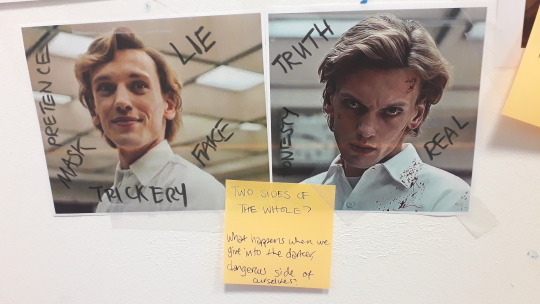
This is what I had on my studio wall space at the time. The post-it note reads: "TWO SIDES OF THE WHOLE? What happens when we give in to the darker, dangerous side of ourselves?"
#art#fine art#traditional art#theatre#human life as theatre#stranger things#vecna stranger things#henry creel#what makes us human#good vs evil#light and dark#concepts of truth
0 notes
Text
mdzs fandom, diaspora, and cultural exchange
Hey everyone. This post contains a statement that’s been posted to my twitter, but was a collaborative effort between several diaspora fans over the last few weeks. Some of the specifics are part of a twitter-localized discourse, but the general sentiments and issues raised are applicable across the board, including here on tumblr.
If you’ve been following me for a while, you’ve probably seen a few of my posts about this fandom, cultural exchange, and diasporic identity. For example, here, here, and here. This statement more directly criticizes some of the general issues I and others have raised in the past, and also hopefully provides a little more insight into where those issues come from. I would be happy if people took the time to read and reblog this, as the thought that went into it is not trivial, and neither is the subject matter. Thank you.
Introduction
Hello. I'm a member of a Chinese diaspora discord server - I volunteered to try and compile a thread of some thoughts regarding our place and roles in the fandom expressed in some of our recent discussions. This was primarily drafted by me and reviewed/edited by others with the hopes that we can share a cohesive statement on our honest feelings instead of repeatedly sharing multiple, fragmented versions of similar threads in isolation.
This was compiled by one group of diaspora and cannot be taken to represent diaspora as a whole, but we hope that our input can be considered with compassion and understanding of such.
For context, we are referencing two connected instances: the conflict described in these two threads (here and here), and when @/jelenedra tweeted about giving Jewish practices to the Lans. Regarding the latter, we felt that it tread into the territory of cultural erasure, and that it came from a person who had already disrespected diaspora’s work and input.
Context
The Lans have their own religious and cultural practices, rooted both in the cultural history of China and the genre of xianxia. Superimposing a different religious practice onto the Lans amidst other researched, canonical or culturally accurate details felt as if something important of ours was being overwritten for another’s personal satisfaction. Because canon is so intrinsically tied to real cultural, historical, and religious practices, replacing those practices in a canon setting fic feels like erasure. While MDZS is a fantasy novel, the religious practices contained therein are not. This was uncomfortable for many of us, and we wanted to point it out and have it resolved amicably. We were hoping for a discussion or exchange as there are many parallels and points of relation between Chinese and Jewish cultures, but that did not turn out quite as expected.
What happened next felt like a long game of outrage telephone that resulted in a confusion of issues that deflected responsibility, distracted from the origin of the conflict, and swept our concern under the rug.
Specifically, we are concerned about how these two incidents are part of what we feel is a repeated, widespread pattern of the devaluing of Chinese fans’ work and concerns within this fandom. This recent round of discourse is just one of many instances where we have found ourselves in a position of feeling spoken over within a space that is nominally ours. Regardless of what the telephone game was actually about, the way it played out revealed something about how issues are prioritized.
Background
MDZS is one of the first and largest franchises of cmedia that has become popular and easily accessible outside of China. Moreover, it’s a piece of queer Chinese media that is easily accessible to those of us overseas. For many non-Chinese fans, this is the first piece of cmedia they have connected with, and it’s serving as their introduction to a culture previously opaque to them. What perhaps is less obvious is that for many Chinese diaspora fans, this is also the first piece of cmedia THEY have connected with, found community with, seen themselves in.
Many, many of us have a fraught relationship with our heritage, our language—we often suffer from a sense of alienation, both from our families and from our surrounding peers. For our families, our command of the language and culture is often considered superficial, clunky, childish. Often, connecting with our culture is framed as a mandatory academic duty, and such an approach often fosters resentment towards our own heritage. For our non-Chinese peers, our culture is seen as exotic and strange and other, something shiny and interesting to observe, while we, trapped in the middle, find ourselves uprooted and adrift.
MDZS holds an incredibly important place in many diaspora’s hearts. Speaking for myself, this is literally the first time in my life I have felt motivated and excited about my own native tongue. It's the first time I have felt genuine hope that I might one day be able to speak and read it without fear and self-doubt. It is also the first time that so many people have expressed interest in learning from me, in hearing my thoughts and opinions about my culture.
This past year and a half in fandom has been an incredible experience. I know that I am not alone in this. So many diaspora I have spoken to just in the last week have expressed similar sentiments about the place MDZS holds in their lives. It is a precious thing to us, both because we love the story itself, and because it represents a lifeline to a heritage that’s never felt fully ours to grasp.
It’s wonderful to feel like we are able to welcome our friends into our home and show them all these things that have been so formative to our identities, and to be received with such enthusiasm and interest. Introducing this to non-Chinese friends and fans has also been an opportunity to bridge gaps and be humanized in a way that has been especially important in a year where yellow peril fear mongering has been at an all-time high.
History
However, MDZS’ rise in popularity among non-Chinese audiences has also come with certain difficulties. It is natural to want to take a story you love and make it your own: that’s what transformative fandom is all about. It is also natural that misunderstandings and unintentional missteps might happen when you aren’t familiar with the ins and outs of the culture and political history of the story in question. This is understandable and forgivable—perfection is impossible, even for ourselves.
We hope for consideration and respect when we give our knowledge freely and when we raise the issue of our own discomfort with certain statements or actions regarding our culture. Please remember that what is an isolated incident to you might be a pattern of growing microaggressions to us. In non-Asian spaces, Asian diaspora are often lumped together under one umbrella. In the west, a lot of Chinese diaspora attach themselves to Korean and Japanese media in order to feel some semblance of connection to a media which approximates our cultures because there are cultural similarities. This is the first time we've collectively found community around something that is actually ours, so the specificities matter.
There is a bitterness about being Asian diaspora and a misery in having to put up a united front about racial issues. Enmity towards one group becomes a danger to all of us, all while our own conflicted histories with one another continue to pass trauma down through the generations. Many of us don’t even watch anime in front of our grandparents because of that lingering cultural antipathy. When the distinctions between our cultures are muddled, it feels once again like that very fraught history is flattened and forgotten.
Without the lived experience of it, it’s hard to understand how pervasive the contradictory web of anti-Asian and, more specifically, anti-Chinese racial aggressions are and how insidious its effects are. The conflation of China the political entity (as perceived and presented by the US and Europe) with its people, culture, and diaspora results in an exhausting litany of criticism levied like a bludgeon, often by people who don’t understand the complicated nature of a situation against those of us who do.
There is often a frankly stunning lack of self-awareness re: cultural biases and blind spots when it comes to discussions of MDZS, particularly moral ones. There are countless righteous claims and hot takes on certain aspects of the story, its author, and the characters that are so clearly rooted in a Euroamerican political and moral framework that does not reflect Chinese cultural realities and experiences. Some of these takes have become so widespread they are essentially accepted as fanon.
This is a pattern of behavior within the fandom. It is not limited to any specific group, nor does it even exclude ourselves—we are, after all, not a monolith, and we should not be placed on pedestals to have our differing opinions weaponized against one another in fandom squabbles. We are not flawless in our own understandings and approaches, and we would appreciate it if others would remember this before using any of us as ultimate authorities to settle a personal score.
It is difficult not to be disheartened when enthusiastic interest crosses the line into entitled demand and when transformative work crosses into erasure, especially when the reactions to our raised concerns have so frequently been dismissive and hostile. The overwhelming cultural and emotional labor we bring to the table is often taken advantage of and then criticized in bad faith. We are bombarded with racist aggressions, micro and macro, and then met with ridicule and annoyance when we push back. Worse, we sometimes face accusations of hostility that force us to apologize, back down, and let the matter go.
When we bring up our issues, it usually seems to come with the expectation that there are other issues that should be addressed before we can address ours. It feels like it’s never really the time to talk about Asian issues.
On the internet and in fandom spaces, Western-coded media, politics and perspectives are assumed to be general knowledge and experience that everyone knows and has. It feels like a double standard that we are expected to know the ins and outs of western politics and to engage on these terms, but most non-Chinese have not even the slightest grasp of the sort of politics that are at play within our communities. We end up feeling used for our specialized knowledge and cultural background and then dismissed when our opinions and problems are inconvenient.
As the culture represented in MDZS is not a culture that most non-Chinese fans are familiar with, we’d like to remind you that you do not get to decide which parts of it are or are not important. While sharing this space with Chinese diaspora who have a close connection to the work and the painful history that goes along with being diaspora, we ask that you be mindful of listening to our concerns.
Cultural erasure is tied to a lot of intense historical and generational trauma for us that maybe isn't immediately evident: the horrors of the Pacific theatre, the far-reaching consequences of colonization, racial tensions both among ourselves and with non-Chinese etc. These are not minor or simple things, and when we talk about our issues within fandom, this is often what underlies them. This is one of the first and only places many of us have been able to find community to discuss our unique issues without feeling as if we’re speaking out of turn.
With the HK protests, COVID, the anti-Chinese platforms of the US election etc., anti-Chinese sentiment has been at the forefront of the global news cycle for some time now, and it is with complete sincerity that we emphasize once again how important MDZS fandom has been as a haven for humanizing and valuing Chinese people through cultural exchange.
Experiencing racial aggression within that space stings, not just because it’s a space we love, but because it feels like we’ve been swimming in rapidly rising racial aggression for over a year at this point.
Feelings
This is a difficult topic to broach at the best of times, and these are not the best of times. Many of us have a wariness of rocking the boat instilled in us from our upbringings, and it is not uncommon for us to feel like we should be grateful that people want to engage with something of ours at all. When we do decide to speak up, we’ve learned that there is a not insignificant chance that we’ll be turned on and trampled over because what we’ve said is inconvenient or uncomfortable. When it is already so difficult to speak up, we end up second-guessing and gaslighting ourselves into wondering whether there really was a problem at all.
We’d like to be able to share what we know about our culture and have our knowledge and experience be taken seriously and treated with courtesy. This is a beautiful, rich world built with the history of our ancestors, one that we too are trying to connect with. When we find it in ourselves to speak up about it, we would appreciate being met with consideration instead of hostility.
We don't have the luxury of stepping away from our culture when we get tired of it. We don't get to put it down and walk away when it’s difficult. But if you're not Chinese or Chinese diaspora, you get to put this book down—we'd like to kindly request that you put it down gently because of how much it matters to all of us in this fandom, regardless of heritage.
What we are asking for is reflection and thoughtfulness as we continue to engage with this work and with one another, especially with regards to how Chinese issues are positioned. When we raise issues of our own discomfort, please take a moment to reflect before reacting defensively or trying to shut us down for spoiling the fun—don’t deprioritize our concerns, especially in a fandom for a piece of Chinese media. We promise most of us are not trying to start shit for the sake of a fight. Most of the time, all we want is acknowledgement and a genuine attempt at understanding.
Our hope with this statement is to encourage more openness and understanding between diaspora and non-Chinese fans while we navigate this place that we’re sharing. Please remember that for many of us, MDZS is far more intense than a typical fandom experience. Remember that the knowledge we have and research we do is freely and happily given, and that it costs us both materially and emotionally. Please don’t take that for granted. Remember too that sometimes the reason for our discomfort may not be immediately evident to you: what seems culturally neutral and harmless might touch upon specific loaded issues for us. We ask for patience, and we ask for sincerity as we try to communicate with one another.
We are writing this because there’s a collective sense of imposed silence—that every time the newest round of discourse crops up, we often feel as if we’re walking away having created no meaningful change, and nursing new wounds that we’ll never get to address. But without speaking up about it, this is a cycle that will keep repeating.
This is not meant to shame or guilt the fandom into throwing themselves at our feet, either to thank us or beg for forgiveness—far from that. We’re just your friends and your fellow fans. We are happy to have you here, and we’re happy to create and share and play together. We just ask to be respected and heard.
Thank you. Thank you for listening. Several of us will be stepping back from twitter for a while. We’ll see you when we get back. ❤️
* A final addendum: here are two articles with solid practical advice on writing stories regarding a culture other than your own.
Cultural Appropriation for the Worried Writer: Some Practical Advice
Cultural Appropriation: Some More Practical Advice
The thread on twitter is linked in the source of this post. Thanks everyone.
#mdzs#mdzs meta#the untamed#the untamed meta#cql#asian diaspora#chinese diaspora#race#racism#mine#mymeta#once again my tag failing me because this is a collaborative work#but! for the sake of organization#statistically average#cultural appropriation#cultural erasure#what else do i tag this im so wired
2K notes
·
View notes
Note
Yay I didn’t miss it!!!! Congratulations again!🍾🎉🎉
I’m going to go with Gyutaro + Breathe For You by Monsta X, or if you feel more comfortable with Choso he works too!
And here are translated lyrics
I’m still on the fence when it comes to demons who were turned when they were underage, even though technically as demons they’re hundreds of years old, so I’m going to go with Choso for this one, sorry my friend! I hope you enjoy it nonetheless. 💛
I took some artistic liberty here since Choso is half human, I’m operating under the assumption that regular people can see him.
Warnings: Stalking, Kidnapping, Forced Relationship, Mild Spoilers (character relations)

Breathe For You - Monsta X

Choso’s existence was an incredibly lonely one, despite his special circumstances.
He wasn’t like other curses where he could only be perceived by those with a specific amount of cursed energy, it was more so due to the fact that he had very little family left and little to no friends he could name.
There was Yuji, and really that was it. The rest of his brothers were either dead or unaccounted for. Outside of that, he had no one.
Until he found you.
Courting wasn’t something that had ever crossed his mind before, so he began to follow you whenever he had the chance to - gathering as much information as he possibly could to make the best impression once he finally introduced himself.
It just… got a little out of hand.
He didn’t have to be fully human to know that the intensity of his feelings for you weren’t what were to be considered normal, but that was just it. He wasn’t a normal being to begin with, so it only made sense that his emotions would be a little more on the extreme side - for better or for worse.
That being said, it still pained him a little when you would try to turn your head away from his kisses.
In a way he couldn’t blame you. He knew it was a lot. He knew you just wanted to go home, but he couldn’t just let you leave. Not when you captivated him so much, and that combined with the fact you had zero cursed energy to speak of? That meant you had no idea just how truly dangerous the world was. How evil it could be.
The idea of you passing so much as a sewer drain would make him double check all the safety measures he had in place to make sure you wouldn’t go on any kind of adventures on your own.
You were angry with him now, but he knew you would understand that he was doing this because he cared for you. He had caught you smiling a few times recently, and it made him fall harder for you - even if the cause of it was because of an escape plan you had thought you’d kept secret.
It just reminded him all over again that this was the best choice to make for you.

© absolute-flaming-trash 2022. Do not repost, modify, copy, or claim.
#riri answers#riri writes#love my moots#lovely laura#I'm sorry this one is a little shorter but I felt like if I added more it would take away from it#Choso#Choso x Reader#JJK#Jujutsu Kaisen#400 followers event#tw yandere#tw kidnapping#tw stalking#tw forced relationship#jjk spoilers
65 notes
·
View notes
Text
The Subtle Horror of Evangelion
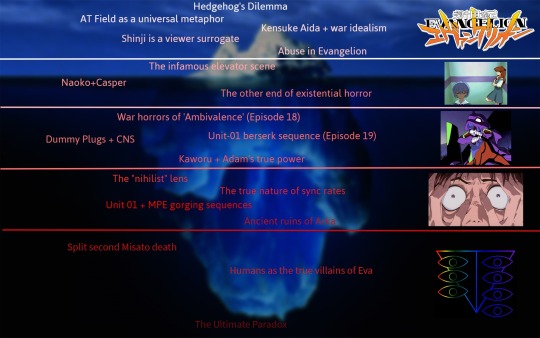
What keeps us all hooked to Eva time and time again? You get through your initial, confused watch of either Evangelion endgame, probably sometime in your adolescence wondering what the hell it is you just watched. The original source material is suffused with unsettling imagery, and sometimes too-close-for-comfort shorts. It’s so much to process that one watch is never enough. The imagery isn’t enough, however, because the mid-to-late-90s series comes with things you’ll pick up the more you focus on certain characters’ struggles or the interesting world-building. They arise little by little with every re-watch, adding onto what interested you in Eva to begin with.
There’s always that little voice asking you “What it is that really draws me here?”
Oh. The horrors.
The tragedy of it all.
These things never leave you the second you bear witness to them, whether you become aware of them or not. You’re disturbed over it, a tad worried, no doubt, but you’re strangely hooked.
Horror works better on limitation, it’s why found footage capturing pale, ghastly, monstrosities of the deep wood will always stand as exponentially terrifying. While most all of us have taken cracks at Eva’s budget at some point, that’s what really drives these terrors home. Its low budget nature made it work.
Evangelion has commentary which forces a viewer to reflect. Most no one enjoys that. It’s the fear, however, that has its audience come back. Evangelion’s reflection alone isn’t what gives Eva it’s charm decades after its run. It’s the little things, most everyone misses, the anxieties, the terrors, all of it. Most of those things, fly over a lot of fans’ heads.
Buckle up, there’s a lot to go through…. (warning for mentions of abuse, body horror, means of suicide, nudity, blood, and gore)
Table of Contents
I. Icebergs for Dummies
Tier 1: The Tip of the Iceberg
II. The Hedgehog’s Dilemma
III. The AT-Field as a Universal Metaphor
IV. Kensuke Aida + War Idealism
V. Shinji is the Audience Surrogate
VI. Abuse in Evangelion
Tier 2: Just Below the Tip
VII. The Infamous Elevator Scene
VIII. Naoko + Casper
IX. The Other End of Existential Horror
Tier 3: The Body of The Iceberg
X. War Horrors of ‘Ambivalence’
XI. Unit-01 Berserk Scene
XII. Dummy Plugs + CNS
XIII. Kaworu + Adam’s True Power
Tier 4: Pre-Abyss
XIV. The “Nihilist” Lens
XV. The True Nature of Sync Rates
XVI. Unit 01+ MPE Gorging Scenes
XVII. Ancient Ruins of Arka
Tier 5: The Abyss
XVIII. Split Second Misato Death
XIX. Humans Are The Villains in Eva
XX. The Ultimate Paradox
XXI. Conclusion
I. Icebergs for Dummies
For those unaware, the iceberg image illustrates that things are much deeper than they appear, just like an actual iceberg. You’ve probably seen this selfsame iceberg--- separated by tiers--- a few times looking through late night internet rabbit holes (Putting it out in the open: I’m personally guilty of this!), fictional or non. It helps you understand why you’re so enticed to certain material, that you’d revisit them. The highest parts of the iceberg are the things in the material most everyone knows, the surface level stuff. The lower you go, however, the lesser known the parts of the material are. These are the things the person are aware of.
Eva has some iceberg illustrations if you look around, albeit they don’t go through the more saddening, sometimes graphic factors of Eva, only theories navigating through Eva’s universe. Evangelion is so deceptively packed with blink-and-you’ll-miss-it subtleties that if an iceberg were centered on that, the diagram would be packed. And I’m being generous as I write this.
A few ground rules, before we begin: The iceberg will deal with the more obscure and dark material as the tiers get higher rather than it only being relegated to obscure bits. The lower the tier, the higher the iceberg and the more subtler the anxieties which graduate into horrors the deeper you go.
Yes, Evangelion is occasionally horrifying. No, Evangelion is not lovecraftian. I think people use the term lovecraftian way too freely. It’s not enough to see something with (sometimes too many) limbs twisted in ungodly angles. Or legs where legs shouldn’t be. The same applies for creatures assuming forms we don’t entirely comprehend. Eva has never delved into the angels being incomprehensibly terrifying specifically because they come from a cosmic expanse.
Some of these actual horrors, big and small, hit you after adolescence, something that makes you feel deeply for the characters’ dilemmas. It’s a feeling that grows and sometimes aches, rather than fades over time for many of us.
Tier 1: The Tip of the Iceberg

II. Hedgehog’s Dilemma
III. The AT Field as a Universal Metaphor
IV. Kensuke Aida + War Idealism
V. Shinji As the Audience Surrogate
VI. Abuse in Evangelion
II. Hedgehog’s Dilemma
Evangelion has its hand in so many psychological and philosophical cookie jars, from Freud, to Maslow, Johari, as well as Dostoevsky. The very tip of the Subtle Horrors of Evangelion Iceberg is something viewers are introduced to in the fourth episode of the series. It is one of the many psychological concepts dotted throughout the original show. Out of all those psychological concepts, this is the most explicit and most recurring.
The Hedgehog’s Dilemma describes the conundrum of two hedgehogs. The closer two hedgehogs become to one another, the more they harm each other with their spines. If you want to properly live, you need the closeness and intimacy of others. By allowing yourself to be close, however, you end up at great risk of being hurt. It’s the very reason what drives those who live to become guarded. Being perpetually apprehensive or building up walls isn’t a remedy for pains, however. The Hedgehog’s Dilemma isn’t just about why people become guarded after relationships ended on bad notes. It’s about the overall inevitability of pain.
Life is a continual push-pull of relationships, because we’re all creatures of comfort. We guard ourselves to varying degrees and sometimes even tell ourselves we won’t get close again, but personal comfort is one of our most ultimate drives.
The Hedgehog’s Dilemma not only describes that harm happens to us anyway, but illustrates that because comfort is universal we seek companionship regardless.
III. The AT-Field as a Universal Metaphor

The AT-Field is the most crucial rabbit hole in understanding the largest meta-narrative of Evangelion.
If Hedgehog’s Dilemma explains the what and the why people become more or less guarded, then AT-Fields explain the how. People build up walls around themselves all the time. You walk away from someone because they crack a smile at you... and it seems off.
Because you feel an anxious pang.
That’s an AT Field.
AT-Fields, or Absolute Terror Fields bear a few metaphors, one of which being boundaries. You see it as Shinji’s fear of becoming intimate, knowing the future implications or Asuka’s masculine protest (putting up a front). We can see an excellent example of the AT Field used by Asuka, her “Wall of Jericho” in episode 9.
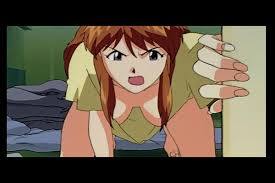
You also see it manifested through the angels, the strange creatures in Eva who supposedly desire to merge with Adam, their mother. Seeing this in the angels makes you realize that the AT Field is actually a metaphor for boundaries which implicates us all. In episode 22, Arael, 15th angel, seeks to understand Asuka. The angel uses its AT-Field (a beam of light) no, its boundary, to breach Asuka’s boundaries.


AT-Fields can be used to not only build up personal walls but to breach them as well. The irony of Arael’s action is that Arael’s AT-Field being erected while it floats just over Earth’s gravitational field makes it immensely similar to the Second Child; they’re both guarded.
The AT-Field is a funny sort of thing because it also sometimes explains how two people who are so alike can be guarded from one another. Sometimes you gain contempt for someone because they’re too much like your least favorable traits. You see this with Shinji and Asuka, both children without their mother desiring validation. Shinji calls Asuka a child midway into episode 9 and Asuka isn’t shy on voicing ideas of Shinji as dense or immature. They’re throwing stones in glass houses.
AT Fields are used to get the user out of dangers both physical and perceived. Sachiel, 3rd angel in the original series’ pilot episode, uses its AT-Field, in the form of flotation, to get itself from enemy fire. It never shows this until it is attacked first.
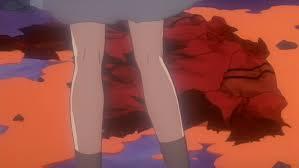
AT Fields are also responsible for one’s identity and physicality in Eva. Without the AT Field you don’t really exist. When Rei assumes the form of the person the character being cast into Instrumentality loved most in End of Evangelion, she’s causing the character to give up their AT Field. With that gone, they lose their physicality, turning into LCL (given the lovely term ‘tanged’ by fans). The ‘tanged’ individual suffers metaphorical death. Evangelion argues that in order for one to exist, others must perceive you and you must perceive you, a point best illustrated in episode 16. Since everyone is converted to LCL, no one really ‘exists.’ Rei describes this unnerving state as the inability of differentiating who you are and others, since everyone lacks a physical state without AT-Fields. Metaphorical death can be argued as worse than physical, since we all exist to make an impression of some sort. It’s what ties all the Eva cast together and the cause of their dilemmas. Validation. You can be living, yet very much forgotten or simply unknown.
There is living and there is “living.”
You can’t “die” unless someone knows you. You were never there.
AT Fields are the thing that make us live, but as a drawback, prevents us from understanding each other fully. Kaworu states in episode 24 that AT Fields are the wall of the mind and the heart of the soul, an unapproachable piece of sanctuary. When all else is taken from us, all we have left is our place of respite.
I’d also like to pitch the saddening reality that the AT-Fields are what prevent us from understanding angels as a whole, our genetic siblings as scared of this world as we are. The psychological angels want to understand us, that much is true. The angels, however, use forms of communication at the expense of our boundaries. Because people greatly value boundaries it makes it hard for us to comprehend angels. The creatures are hardly malicious when you realize they wonder why we all do things that actually hurt us, as well as the fact that they do understand our minds. But, because they breach our boundaries, we become even more wary of the (mostly) unknown. Angels may be us, but the strange forms they take are something we aren’t familiar with. The feeling is mutual with angels, wondering why there are many of us, our forms and outward appearances so identical. It’s a truth as old as time that we all fear the unknown.
The anxiety of an AT Field means comprehending that there’s very little chance to 100% get others. Because we’re all wary in some degree, because we’re set in an idea or perception of someone, even if the someone in the past no longer applies. It’s not healthy for you to continue dwelling on relationships not meant to be, keeping yourself up at night asking why, because both of you have closed off each other for good. There’s always that chance the other can come back and if they do seek to understand despite past hardships, that’s good. If they don’t, all you can do is move on and accept it.
IV. Kensuke Aida + War Idealism
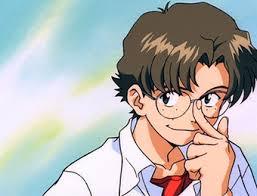
Kensuke is one of Shinji’s classmates, a supporting player in the series. He’s close with Toji Suzuhara, a boy who takes his anger on Shinji, after finding out that his sister has been injured during Shinji’s fight with 3rd angel Sachiel. As Suzuhara beats him down, Kensuke downplays the incident. Kensuke’s and Toji’s relationship is particularly interesting because the latter is affected to some degree by war (the war by humanity to prevent our destruction by angels). Kensuke glorifies the sentient, implicitly eldritch, multi-armored war-machines.
Kensuke can be best described as the ‘wow, cool robots’ drawing you’ve probably seen floating around. This is in relation to Gundam’s war commentary, but replace Gundam with Eva. Kensuke is enamored with the Evangelions and totally, willfully ignorant to the war horrors. Adolescents are forced to be the salvation of humanity, feeling every bit of damage to their own bodies whenever the Evangelion takes any hurt. Even after the war for humanity is long over, the pilots will be afflicted with traumas that will always hang over them.
Kensuke’s glorification is also what draws him to be Shinji’s friend. He uses Shinji’s status as a way of becoming a pilot himself by meeting up with Misato, putting himself at the cockpit of a strange creature magnificent machine.
When Toji becomes hospitalized after his battle in a hijacked Unit-03 vs. A Dummy System-controlled Unit-01, Kensuke expresses discontent at not being a pilot. He’s annoyed because “everyone” but him is a pilot.
Thing is, Kensuke isn’t heartless, just ignorant. Idealism is one of the uglier things that runs thick in the heart of Evangelion. His is one of many cases of unhealthy idealism in Eva, another example of making it difficult for those living to understand one another.
V. Shinji as the Audience Surrogate
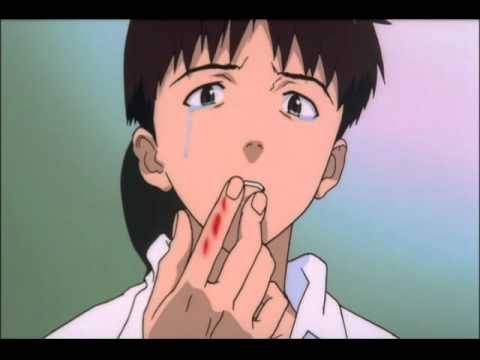
Shinji as the audience surrogate isn’t always touched up on, but is sort of understood subconsciously by a lot of the viewers. Shinji’s character is specific, yet so generalized that him being a surrogate for the audience just… works. Don’t believe me? Shinji gets two psychological exploration-based episodes whereas Asuka and Rei each have one. Episodes 16 and 24 are both psychological angel episodes, albeit the latter is more in-series subversive. The 24th episode doesn’t involve a breach of subconscious boundary, but the pilot (Shinji) is in the hot-seat, being made aware of their issues. Leliel, 12th angel, contacts Shinji in the former of these. Both characters talk to one another, shown as a series of horizontal lines and vertical lines, sometimes intersecting. These lines are a strong reference to the Johari Window, a tool in psychology which helps someone become more aware of themselves. The Window’s quadrants are as follows
1. the part known to the self
2. the part known to others
3. the part known to the self and others
4. the part known to no one
Leliel also states that the self only exists of one perceives themselves as well as others. The angel also states that Shinji could better his reality, to which Shinji absolves himself of responsibility by arguing the horrible state of his reality. It’s a subtle pushing to Shinji and by extension the viewer into free will. Kaworu builds up on these concepts with Eva’s in-universe concept for boundaries. Free Will versus Determinism is brought up here, with the idea that AT-Fields are brought up because the living (again, not people – emotional complexities aren’t only human) will them into existence. By exercising free will, it means enduring pain, one of Shinji’s, and again the audience’s greatest fears. Any relationship has pains and conflicts. This is all a buildup of free will, determinism, self-awareness, and the Hedgehog’s Dilemma. Understanding all of these means swallowing the “pain is inevitable” pill. The problem with much of us is that we like the idea of relationships rather than being in one. We want to feel validated but without the conflict, even if the conflict can be solved. We’re all Shinji because we’re all aware to life’s hellish catch-22s, so we run. There’s times in our lives where we run as far as possible from these woes, these truths, but there’s pain in running too. It’s why escapism seems like such a viable action for some of us.
Pain is inevitable, but pain can be mitigated.
More damning evidence to Shinji being a viewer stand-in lies in either endgame of Evangelion (pun intended). In EoE, after the Komm Susser Tod sequence of everyone on Earth being tanged, we’re treated to a shot of EoE’s live audience.
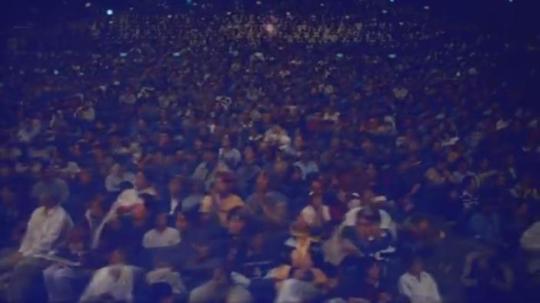
We hear Shinji’s voice about his reality while he talks to Rei toward EoE’s end. There are shots of the city, of people going about their daily lives cementing that this is about us. End of Evangelion shows us a less favorable side of Shinji, a departure from the lauded end series “Congratulations” scene, in which he does understand free will rather than perpetually dwell on negatives. Shinji reacts unfavorably toward Asuka in EoE after his mother’s speech to the audience that ‘anywhere can be paradise’ and Shinji stating he doesn’t know where his happiness resides. Shinji (We) still has a ways to go if he wants to be a better person.
It’s probably why many of us are either inclined to champion Shinji or harangue him, and either reaction is fair. Many of us are aware of audience surrogates, but never to this extent. Shinji isn’t his best person, but he can be. Being his best means self-reflection. Droves of people who first were exposed to Evangelion were teens, and again many of Shinji’s woes are specific yet so generalized, hence our feelings of defense and possibly disgust.
No one likes scathing, yet accurate call-outs on their person, but they’re paramount for us to understand ourselves and others.
VI. Abuse in Evangelion
One of the worst things recurring in all of original Evangelion is a bevvy of abuses.
Abuse comes in many shapes and forms and it’s many characters’ realities. Abuse happens not because the universe ‘wills it’ (determinism aka, ‘that’s just how people are’). Abuse, be it conscious emotional absence, actual neglect, among other ungodly acts fly though the cast.
Abuse is cyclical and a lot of those doing it often get away with murder because they have power.
Much of Eva is comprised of children being forced to sort through adults’ emotional baggage. Those children become adults and the cycle continues.
We all know a Gendo. Or even perhaps a Misato. Hell, even a Ritsuko.
Anno states that Gendo’s character is of a societal meta-text, which explains many viewers’ ire in relation to the character. He’s responsible for many of the seedy goings-on in Evangelion be it the financial (see: Jet Alone’s orchestrated out-of-control nature to give NERV more funding) or abuses (see: Rei, Shinji, Ritsuko, and, Naoko). It’s for this reason why Gendo’s actions are a sore spot for a lot of fans.
Anno: I’m not sure that it’s a real father [that Gendo represents]. Well, not a father in the sense of a parent with a blood relation to his child, but more, I think, [in the sense of being] a representative of society or the system. That’s why he has that expression.
Takekuma: So, he’s kind of amorphous.
Anno: The angels are the same. I made them appear amorphous in that way because, for me, society is unclear, the enemy is unclear.
Takekuma: Gendo is [a representation of] the boundries or the pressure of society itself.
Anno: That might be it. Perhaps Gendo is [a representation of] society itself.
http://wiki.evageeks.org/Statements_by_Evangelion_Staff
After many re-watches of certain Eva episodes, it just hit me, as I’m writing this why I’m sometimes apprehensive on an adult-exclusive lens of the show. This happens a lot in adolescence and our struggles are made trivial because of the mishandled baggage. As children, you’re meant to be subservient to parental whims. You have this sort of obligation to solve their problems. Give them closure. It doesn’t even need to be parental baggage, but just from adults in general. You see the way the adults act not just with the children but with each other. You see the way Gendo justifies neglecting Shinji, objectifying Naoko and Ritsuko or Naoko’s emotional absences as a mother to her daughter (also manifested through the MAGI). It’s these immature excuses as to why they can’t extend empathy to those around them.
It’s always excuses.
Eva’s original series has always been a show about children.
Tier 2: Just Below the Tip

VII. The Infamous Elevator Scene
VIII. Naoko + Casper
IX. The Other End of Existential Horror
VII. The Infamous Elevator Scene
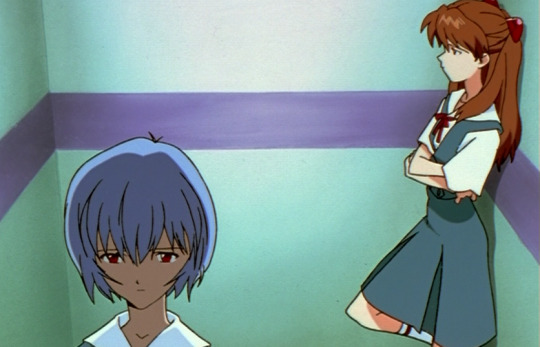
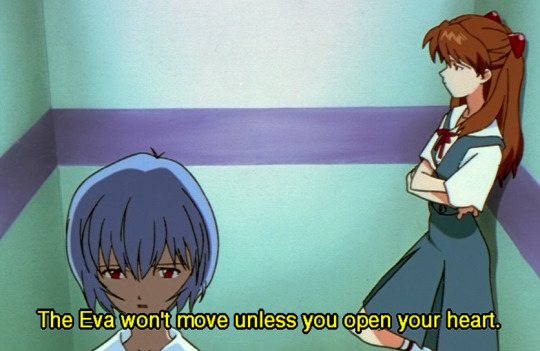
The Elevator Scene is a sequence that sometimes gets glossed over due to Evangelion’s fleeting budget. It took me years to realize the true gravity of the awkward silence of both the 22nd episode and its Director’s Cut version. The Director’s Cut version has Asuka abruptly jerking in the silence, but that blink-and-you’ll-miss-it moment speaks volumes. Understanding the scene means understanding why Asuka quietly stews in her anger. Understanding why Asuka stews means understanding Asuka from her debut to her emotional breakdown.
Asuka’s appearance in the 8th episode, Asuka Strikes!, is marked by a bold persona that carries on until the end. She isn’t shy on imparting her prowess to Shinji, stating that Units 00 as well as 01 were the prototype and the test type, respectively. Her Evangelion, Unit-02 is the finished product. She even states that she graduated from university. Despite these impressive feats so early in adolescence, the only time in which they’re noted is when Asuka talks of them. Misato takes in both Shinji and Asuka, but only ever “dotes” on Shinji. Gendo pays attention to Shinji because he pilots Unit-01, and 01 contains the soul of his late wife. Rei is the clone of Gendo’s late wife, hence Gendo’s attention and overall creepy, selfish obsession with her. Asuka and Shinji’s relationship, with Misato as their caretaker strongly mimics a Golden Child and the Second Fiddle. The only difference is, Shinji gains more attention due to Gendo’s and Misato’s respective baggage. Again, Eva is a series where children are forced to handle the baggage (with no break in the cycle) and when the child doesn’t have anything the adult particularly can clue in on, they become neglected.
That’s Asuka’s dilemma.
It’s why Asuka forces herself to grow up.
It’s why Asuka is driven to be competitive to Shinji and Rei, later growing contemptible at both.
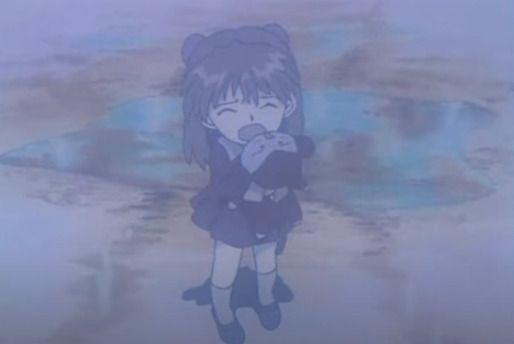

Asuka suffers a few curses, one of which being the youngest, the inevitability of being consciously sidelined dawns on her, leading to her selfsame breakdown toward series’ end. She aligns youth with trivialization, so naturally, she’d front with the opposite. She never gets help in relation to her period. Misato and Ritsuko realize something is up with Asuka but they never really offer her the support.
There’s also the flashback to her trauma in episode 22’s beginning. She’s replaced by her mother post-Contact Experiment (which led to a deterioration of her mental health) via a doll that looks like her, red hair in pigtails. It’s the leading factor to her feigned boldness, her ego. The way in which she is marginalized in the series brings it all back.
Rei breaks the silence with a few words of compassion and all Asuka can do is express disbelief. She mistakes compassion for contempt.
For pity.
The idea that anyone would extend kindness, especially now of all times, is unbelievable.

Asuka also experiences a dilemma here, a dilemma those like her face. She already knows what it means to be vulnerable and deeply hurt, but she needs to make herself vulnerable because now, more than ever, she needs the support. Being vulnerable will cause past traumas to flood back in full force, but by stewing she deprives herself of any support. Rei offers that support, but a few words of support in a wave of trivialization can’t help but feel a bit too strange.
Asuka’s greatest anxiety is realized in the twenty second episode. It’s of being and staying second fiddle, that she’s always been set up to fail. Even 2 episodes after the fact, in which she actually starves herself does she realize once more how she’s permanently ‘below’ others.
Asuka’s curse finds itself in real life, and it’s for that reason why I believe some find themselves resonating with her. Asuka’s gradual descent into bitterness is something I find myself waking up some nights thinking about after 7 years going through Eva; hers is a cautionary tale on being emotionally distant to cries of a damaged youth. Casually imparted knowledge of past achievements, and the competitive attitude mixed with embitterment, some of which from a genuine place but also a product of neglect. We were forced to play second fiddle, we forced ourselves to grow up to feel more legitimate, forced to carry an ire that stews because it seems no one listens.
VIII. Naoko+Casper
The late Naoko Akagi is a woman of multitudes. Those multitudes are compartmentalized into the 3 MAGI. They are Balthasar, Melchior, and Casper.
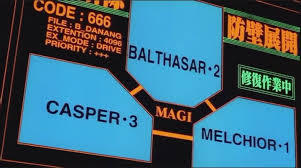
Casper shows itself to be the most prominent aspect of Naoko’s personality, her as a woman. Ritsuko states that, after the defeat of Iruel, 11th angel, that Casper is the part of her mother which remained that way to the end.
Balthasar and Melchior have been bested, be it by rival MAGI, or Iruel’s assault. This calls back to the fact that Naoko’s other facets aren’t anywhere near as prominent. Naoko has cited her own emotional negligence, of only showing emotions should it ever benefit her.
Casper on 3 occasions fights tooth and nail, Iruel’s assault, an attack by multiple MAGI in End of Evangelion or the defiance of Ritsuko activating the self-destruct sequence. Ritsuko does this to seek vengeance against Gendo for coming to the immense realization that he never genuinely cared for her. Gendo has always used Ritsuko for her body. This would destroy NERV, meaning killing herself and Gendo.
Then you realize why Casper overrides the sequence.
Casper’s stubborn behavior wasn’t actually to defend NERV but to protect Gendo. Casper’s defiance aka Naoko’s emotional absence toward her daughter allowed Gendo to kill a bewildered, rightfully angered Ritsuko.
The saddest part of Casper’s, no, Naoko’s choice is that Naoko got away with murder. Evangelion is a story about children dealing with the selfishness of adults and the adults never receiving justice for their wrongdoings. The relationship between Ritsuko and Naoko is an excellent example that this doesn’t just implicate the young pilots. Ritsuko dies in End of Evangelion with the truth that her mother, as a woman, in the end chose the man who manipulated both of them.
IX. The Other End of Existential Horror
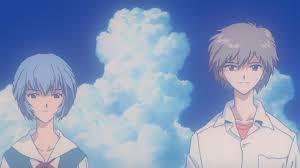
Some spend their whole lives trying to make a mark. Others can’t help but be known.
People get smart sometimes to get themselves out of a current situation. Kaworu and Rei’s existences are such that they’re deadlocked from living. Their existences are the product of an experiment, to be later heavily watched and raised as the Last Messenger. The latter is the result of Gendo’s obsession with his late wife.
Kaworu and Rei’s existential crises are opposite from the rest of the cast; while others do their damndest to become known, they cannot be unknown. Rei’s character centering more around her identity than other characters is also initially and sneakily alluded in the opening.

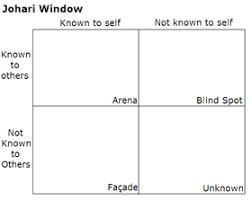
The Johari Window is a tool encouraging self-awareness in the person, alluded to twice in the show, with the second time being in the sixteenth episode. Both usages of that illustration, for Rei, and Shinji drive home crucial aspects of the meta-text.
This would also tie Rei to Shinji in End of Evangelion forcing Shinji to reflect on his own awareness and will. Rei is an astute, young girl whose arc is about her personal relationship with identity, something she is all too familiar with due to her objectified nature. Rei’s arc is even more so entrenched in identity than other characters that she is one of the characters imparting personal and universal realities.
Ayanami Rei’s existence from start to finish is inundated with the issues of others, causing her to internalize being always expendable. In Rei’s Poem in episode 14, it becomes clear that she sees herself based on usage. She likens herself to a field of flowers, which slyly alludes to the Dummy System’s “parts” 9 episodes later, other Reis.

Rei is seen as malleable vessel which houses thoughts rather than her own person and she can’t do anything about it. So she resigns to her reality. Even if she does tell off Gendo in End of Evangelion for his objectifying, she’s not even out of the woods. She never will be.
I used to think Rei’s “slap” to the face to the man with the (most) baggage was empowering. Then I learned about abuse during adolescence, how kids who lack a support system act while away from their abusers. Even saying an emphatic “fuck you” to your abusers isn’t enough to be a happy ending. Rei is a girl who lacks a support system and she suffers from it. Start to finish.
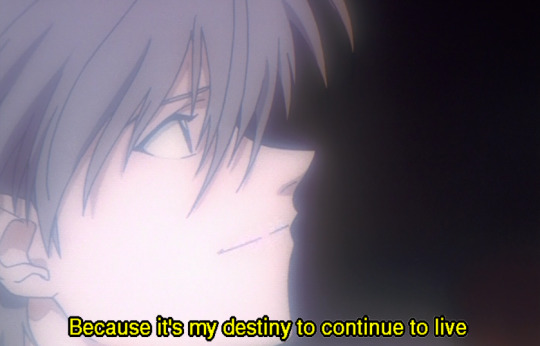
Kaworu’s crises are much trickier to pinpoint because there’s so little to work with. He doesn’t get an episode dealing with personal, subconscious explorations. Getting his character means first getting how Evangelion re-contextualizes what “Ode to Joy” symbolizes. It also means understanding the AT-Field and most people won’t pick that up on an initial foray. Or maybe even a second. Most people don’t pick up that the AT Field implicates anything living and physical or its metaphor for boundaries and identity. There’s the common misconception that Evangelion is a “human” show.
Kaworu marks off his appearance humming “Ode to Joy” while Shinji wonders who to turn to. It’s a song generally known for its jovial nature, but most importantly, Ode to Joy is:
known also as the “Choral” Symphony. Its finale is a musical setting of Friedrich von Schiller ’s “Ode to Joy,” a hymn to the unity and freedom of humanity.
http://www.dictionary.com/browse/ninth-symphony
The Choral Symphony assumes a more horrific context later on. Kaworu is the last messenger and what his action is would lead to the mass annihilation to lilin/human or angels. ‘Unity of man’ is changed in Eva’s context – it marks either unity of man or the death of man. It doesn’t matter who Kaworu allows unity to, because his hands would be stained with death anyway. Then you realize why Kaworu deploys his most powerful AT Field during his descent to Heaven’s Door.
This is his reality.
Kaworu’s status as the Angel of Free Will isn’t about him being the only complex angel, as a lot of people think. It’s about being the sole individual handing that freedom to others.
You realize his terrifying dilemma goes to the tune of being feared for his own existence as an angel (which he notes to Shinji) and not being able to properly live.
Sometimes you ”hurt” people by existing.
Sometimes people hate you for the simple act of existing.
Kaworu’s and Rei’s terror is the other end of existential horror, that you can’t help but forced to be known. Sometimes you have knowledge but aren’t allowed to do much with it.
Tier 3: The Body of The Iceberg

X. War Horrors of ‘Ambivalence’
XI. Unit-01 Berserk Scene
XII. Dummy Plugs + CNS
XIII. Kaworu + Adam’s True Power
X. War Horrors of ‘Ambivalence’
Episode 18 is where anxieties graduate into horrors both implied and visceral. Unease hangs over the episode, with the mystery of Unit-04’s disappearance and tests being done on Unit-03. Misato tells Shinji that because tests would be done, there’d be a pilot there. Misato uneasily withholds this info from Shinji and Kensuke breaks the silence with his recurring desire of being a pilot, still ignorant of the war horrors. There’s a subtlety that Shinji picks up on with Toji but not enough to put two and two together: that the big-eater himself isn’t feeling so hot.
The continual chirp of cicadas and birds nor the peel of the school bell are enough to break the unease of the viewer or of Toji. Toji goes from indirectly being affected by war vs angels to being chosen, drafted even, a child at the first line of defense for the apocalypse. We get a flashback of him beating down Shinji, before it cuts back to present day Toji. He will be in Shinji’s shoes.
Toji balls a fist, a recurring theme in Eva, to the tune of “What is your hand for?” Toji is finally about to take things into his own hands.
Asuka takes a few cracks at Shinji to Hikari that he hasn’t quite gotten the memo, but when Shinji asks her even she’s halted in words.
Then the day comes.
Tests are being done and suddenly Unit-03 goes rogue with Toji in her (note the Evangelions have the souls of the pilots’ mothers, save for Rei). Unit-03’s’s strange behavior is revealed to be the work of the 13th angel, Bardiel. Shinji’s ignorance is made worse by Misato’s absence (with Misato telling Ritsuko she’d tell Shinji the pilot’s info after the tests). Units 00 through 02 are sent out for the new threat and Shinji sees this new threat. Anxiety rises.
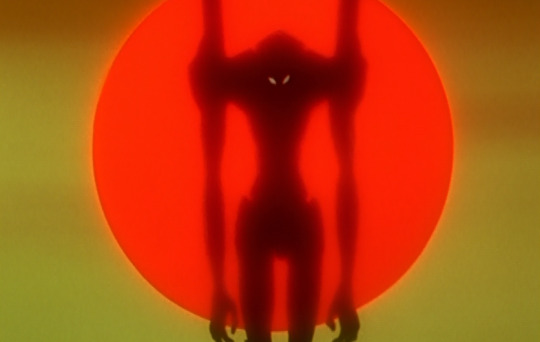
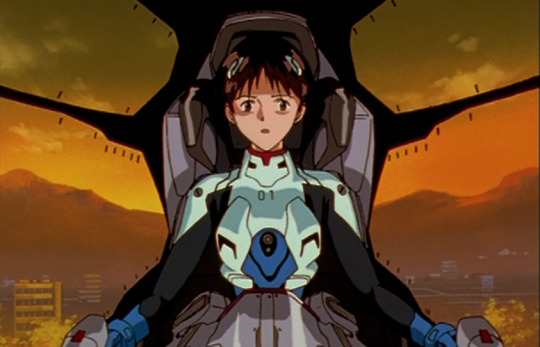
The song “Marking Time Waiting for Death” accentuates the anxiety. Unit-03’s silhouette eerily contrasts with the sun, her body slightly hunched and approaching slowly.
Fear washes over Shinji when he deduces that with an Evangelion inside, there must be a pilot.
Yet he still doesn’t know.
The other pilots are aware, and show reluctance to the revelation. A hijacked Unit-03 sets herself on Asuka, Rei, and even strangling Shinji. Shinji allows the angel-hijacked-being to strangle him, because killing another human being is simply horrific.

Eva has its hand in the war morals cookie jar here because Shinji stands at a conundrum, to other let this creature take his life or to murder flesh and blood. This dilemma goes double-time in war. Gendo asks why Shinji hasn’t dealt with the 13th yet, with a somewhat horrified Shinji pleading about the pilot. Gendo commands for the unfinished Dummy System to override Shinji’s controls and then suddenly...silence….
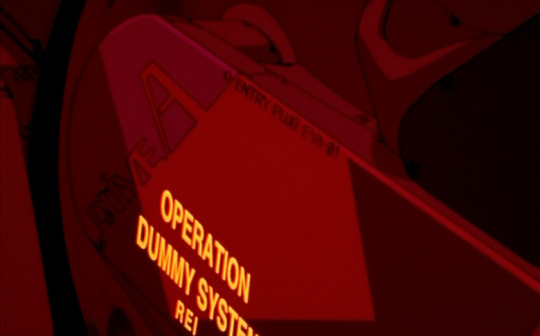
The Dummy Controlled Unit-01 springs back and we’re treated to a close-up of Unit-03/Bardi3l being strangled.


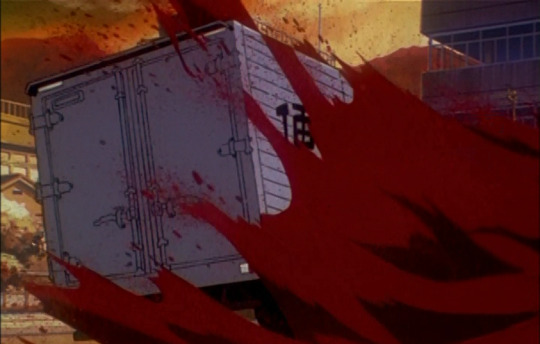
A nauseating crunch sounds and the unit goes limp. A controlled Unit-01 proceeds to raise hell on the incapacitated enemy, resulting in the unit’s blood and guts flowing through the streets. NERV’s personnel can’t do anything save for become fearful at the Dummy System’s capabilities. Terrible, visceral noises sound one by one as blows strike, as the unit’s severed limbs and blood splatters riddle the urban battlefield. Shinji hears every second, every squelch and splat.
Imagine the pain of 03’s pilot.
But the terrors don’t cease here.

01 doesn’t stop at just raising hell on the incapacitated 03, and we’re treated to another close-up shot of 01 tightly holding onto 03’s entry plug, before crushing it.
Somewhere away, Misato receives news that Unit-03 has been dispatched as an angel. Shinji feels the weight of having actually killed someone, before Misato actually breaks the news that the pilot is not only alive but that the greatly injured pilot is his classmate.
It never really hit me until now how this scene holds another horrifying subtlety. Compare this to episode 3, where Toji’s first interaction with Shinji involved him punching him, the very scene playing at this episode’s beginning. The 18th episode ends now with ,Toji and Shinji are both joined in the same camp, of children emotionally and physically marred by war, not able to fully control their situations.
XI. Unit-01 Berserk Sequence
Shinji stands in a situation where he can no longer take the terrors aligned with the Evangelion. He’s gone from sustaining injuries great and small from combat with the eldritch angels, to indirectly harming a friend through it. He resigns from his position as a pilot, understandably running away even with the approach of the 14th angel.
After a talk with Kaji about how he can control his future and he only, Shinji once again puts himself at the forefront of further pains. He must once more thrust himself to the terrors that align with the war-machines whilst struggling with other traumas.
During his fight against Zeruel, his Evangelion dies out and it all floods back to him. Shinji once again finds himself at a position of no power, frantically pressing at his controls to no avail.

He can only hear blow after blow of the 14th’s onslaught. He and Unit-01 are at their most vulnerable.
Until Unit-01 springs back.
W hat follows is the famous Berserk sequence, a scene whose terror can be thanks to Evangelion’s low budget.
We see the Evangelion in all her terror and the sort of off-ness that carries in this scene.

Episode 19 has no problems on treating us to front-row tickets to terror.
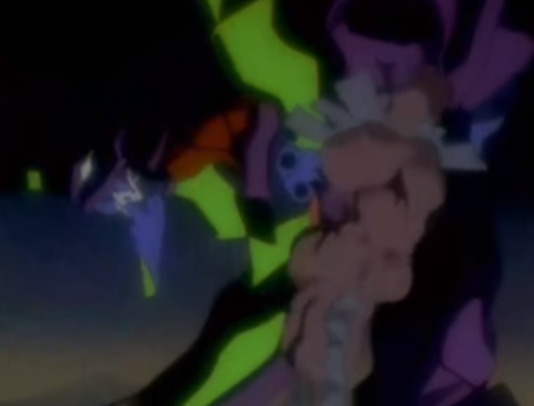
Unit-01 snatches part of Zeruel’s appendage and adds it to her mass. A sickening squelch sounds and her new appendage contorts into place in an instant.
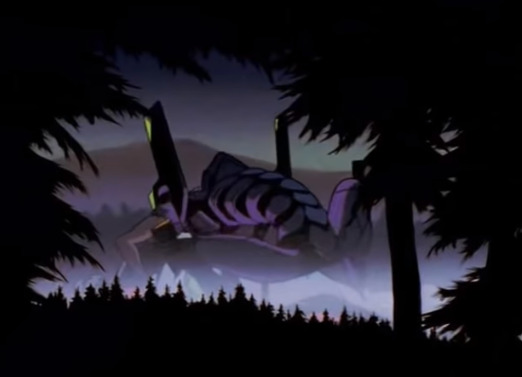

She moves over to her incapacitated, angelic meal and doesn’t hesitate to chow down. The shots feel too personal yet nowhere near in the sense of the show’s meta-textual reflections. It’s almost like stumbling on a cryptid and when she shoots a look at the viewer, it feels as if she’s looking at us, like we’ve interrupted her dinner. Or perhaps she did finish the meal... and she’s in the mood for seconds? Perhaps even thirds?
The bizarre and eldritch nature of the Evangelions goes full force with this imagery. Episodes 2 and 16 laid the foundation of how off the Evangelion Unit-01 was with how she openly mutilates her targets. Or even the unsettling roar of Unit-01 that’s not entirely bestial. The sound is straddles a line between the blood-curdling bestial and the human. But here? Eva Unit-01’s position, from her hunched figure, to her more feral position as she feasts, feels far too organic...and far too human.
The Evas themselves aren’t human, but the souls housed within are. Eva’s souls are souls of the respective pilots’ mothers, an example of the mother and child symbolism omnipresent in Neon Genesis Evangelion.
Shinji’s mother is Yui and as we go through the series, we realize the s2 engine appliance was intentional. An s2 engine offers infinite stores of energy and this is needed for Instrumentality. With the s2 engine within her grasp and the fact that Evas don’t subsist on anything, this would make the consumption of 14th completely recreational.
It’s super tempting to frame this scene as containing some abomination that now stands unchained and indiscriminate in its targets, but it isn’t. It’s sort of understandable because Units 00 and 02 don’t come close to exhibiting this sort of behavior nor were they in this circumstance. Neither Unit-00 nor 02 have any desires in regard to Instrumentality. In the end, we should look to Yui and her own endgame, because Yui’s running the show here.
XII. Dummy Plugs + CNS
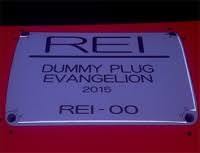
Ritsuko states the Dummy Plugs are machines which imitate pilot’s thinking. There’s a bit more than the possibility of this being 100% AI due to the apparatus Rei is in.
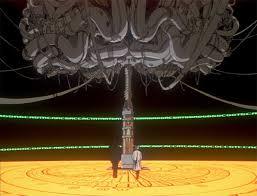
This very likely implies the respective person’s thought processes added with AI programmed in a way which best “describes” the pilot (basically how they are perceived). In episode 17, Rei is situated in this apparatus strongly resembling the central nervous system, the brain and the spinal cord.
{The central nervous system CNS is responsible for integrating sensory information and responding accordingly. It consists of two main components:
1. The spinal cord serves as a conduit for signals between the brain and the rest of the body. It also controls simple musculoskeletal reflexes without input from the brain.
2. The brain is responsible for integrating most sensory information and coordinating body function, both consciously and unconsciously. Complex functions such as thinking and feeling as well as regulation of homeostasis are attributable to different parts of the brain.
https://mcb.berkeley.edu/courses/mcb135e/central.html
Ritsuko imparts the unsettling revelation about Rei and by extension the Dummy Plant itself (after Misato coerced her into learning about Rei). The Reis are the core of the Dummy Plugs (and the System used to brutalize a hijacked Unit-03 and its trapped pilot). This scene adds more to the extent of Rei’s objectification, of her being replaced. It adds on to Rei III’s comment of being ‘the third.’
Rei isn’t savage by any means but the sheer brutality of Dummy System’d Unit-01 5 episodes prior may hint at her straightforward nature.
I’d like to pitch that Ritsuko’s approach to Rei’s Dummy Data was also the product of her subtle animosity toward Rei. When she refers to the Dummy Plug as a machine which mimics human thinking, she’s talking about Rei. She also refers to her similarly in episode 23 by referring to Rei as spare parts, as if Rei herself is some soulless machine whose parts can be switched out if need be. This could also call back to Rei’s poem, in which she calls herself a vessel which holds human thoughts.
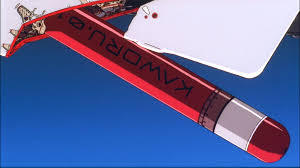
Another question remains: how does Kaworu play into this?
The MPEs (the Mass Production Evangelion series) use Kaworu’s Dummy data, meaning that there are cloned Kaworus stored off somewhere, perhaps floating with soulless smiles the same as Rei has.
Treated as spare parts.
This also implies that Kaworu is more or less reduced to an object.
What’s more disturbing is the nature of the MPEs gratuitous method of ravaging and mutilating Unit-02 and by extension Asuka.
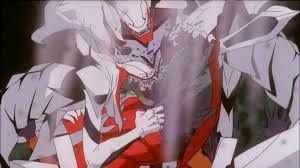
Kaworu hasn’t ever demonstrated any degree of malice, so this can’t really insinuate a ‘Kaworu is secretly evil’ narrative. But this can tie back to a recurring theme of humans fearing and despising angels. It’s because of this that the revelation of our genetically identical nature or the fact that they can comprehend our psychology is framed in-show as kind of shocking. It is because we’re so disturbed at the angels’ existence (or anything else we don’t comprehend) that we view them as inherently savage in nature. Kaworu’s quick-to-perceive personality most likely translated itself along with the AI. This would also rule in the somewhat strategic way in which the MPEs act against Asuka, exploiting her attack patterns through surprise attacks.
Some of Kaworu’s as well as Rei’s Dummy Data are the product of universal (Kaworu) and personal (Rei) contempt by people. Let that sink in.
XIII. Kaworu’s + Adam’s True Power
The bottom of the fridge horror portion of this iceberg is something that has subtly plagued me for years. We’ve only ever caught glimpses of Kaworu’s abilities in his debut episode. I picked up on it little by little with each re-watch of the episode, with every other time his abilities dawning on me. If I wasn’t focusing on how his character fits in the greater framework of Evangelion, I was cluing in on his abilities.

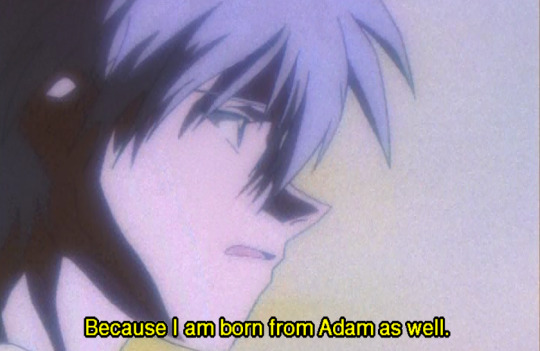
One of his abilities is being able to block out light, magnetism, and subatomic particles. Some of the forces which make up the universe. This witnessed by the viewer when he realizes the whole of humanity’s welfare hangs by a thread, due to the coexistence of angels and Adam.
Adam.
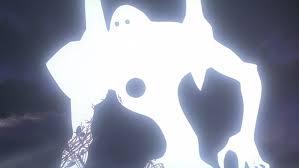
Adam’s soul lies within Kaworu. Adam. Who utilized an Anti-AT Field which caused Second Impact. An Anti-AT Field, which killed off much of the Katsuragi Crew in Antarctica.
This makes Kaworu the most powerful angel in the original Evangelion series.
Eva has shown that ownership of an angel’s soul (or partially, if you’re onboard the Rei I is in Unit-00 theory) allows the person to inherit the angel’s abilities through Rei. Rei blocks off Kaworu’s immensely powerful field with one of her own, canceling out both as a result. As we know, AT Fields for people are a figurative affair. People lack the physiology to exhibit a physical AT Field because they don’t have cores like angels do. Angels’ souls when possessed by humans have a sort of ability to circumvent parts of human physiology (if you’re looking for the whole package, you should eat angel’s flesh too). Rei also shows the ability to float, implied in episode 24 and shown explicitly in End of Evangelion.
But this raises a few questions about the last messenger is the ability to block out some of the forces of the universe Adam’s powers or Kaworu’s? Another ability that continues to plague me the more I think about it is Kaworu’s AT-Field usage on Heaven’s Door to bypass its lock.
We haven’t actually seen Adam’s other powers (if the angel has any) because the it’s anti-AT Field was halted via Lance of Longinus. Other than its ethereal appearance in flashbacks, we only see an incapacitated Adam in embryonic form. That’s it. We don’t know if Adam exhibits any other powers due to this impediment. If Adam does have more powers, this would add onto both the fridge horror factor of Adam and Kaworu.
Tier 4: Pre-Abyss

XIV. The “Nihilist” Lens
XV. The True Nature of Sync Rates
XVI. Unit 01+ MPE Gorging Scenes
XVII. Ancient Ruins of Arka
XIV. The “Nihilist” Lens
There’s something that implicates the whole cast. Something that goes beyond the meaning of the AT-Field, and the all-too-known Hedgehog’s Dilemma.
Eva is filled to the very brim with psychological concepts, but there’s one thing which ties this all together. It goes much larger than the desire to become validated or cycles of abuse and unresolved issues to a newer generation.
Free Will Vs. Determinism ties the entire cast together and is disturbing in its own right. It not only ties the cast together but also contributes to Eva’s meta-narrative.


Episode 16’s sequence with Leliel, Shinji, and the Johari Window gives little breadcrumbs to this psychological dilemma. Leliel teaches Shinji about his own identity as well as slowly ushering him to a sense of self-awareness. Leliel also attempts to usher Shinji out of filtering reality with only convenient parts. Shinji argues that he can’t really be held culpable for his actions, because the one and only reality is that reality is awful, bar none. Not his reality, but reality as a whole. This deterministic stance becomes ever more blatant 8 episodes later with the appearance of Nagisa Kaworu.
Kaworu’s designation is the angel of free will. The irony of this stands in the fact that Kaworu isn’t the only angel who can exhibit free will (with some of the angels before him taking the time to try comprehending people). Kaworu’s status comes from his identity as the last messenger, bringing about freedom for one species (humans/lilin or angels) at the expense of the other. Kaworu knows his reality well and in the end, seeks to better the reality of those around him. Eva doesn’t romanticize the prospect of free will, however, because Kaworu is so aware of his own person and how he can hurt those around him that it greatly bothers him.
The metatext doesn’t just position Shinji as being in the wrong, but also the audience. Remember the point I made before about Shinji being the audience substitute? It’s further hammered home from the series’ tail end and into End of Evangelion.
“That’s just the way things are.” is a common response to things in life we feel resigned on changing, because we don’t know how to change them. This quote is a parallel to Shinji’s “humans aren’t made to float!” in episode 16.
Shinji does know how to change much of his reality, but by doing so he’d be pushed into free will. Free Will is the solution and it means holding yourself accountable rather than believe that it’s everyone else with the problem. With the idea that you can change your reality, it offers you the opportunity to love yourself.
If you love yourself, then it becomes much easier to love others.
Eva’s free will and determinism metatext hammers home the extension of empathy.
Shinji/the viewer’s greatest problem is that because we don’t love ourselves it makes it difficult to extend the love to everyone else. Shinji’s love translates as idealism. Because of his unhealthy idealism, he is hindered from understanding people.
By ascribing your beliefs from determinism to free will, it opens your mind to an entire world of possibilities, but therein lies the terror. It is because of these possibilities that Shinji and by extension, the viewer, likely fears free will. Shinji finds ways make himself validated, but with free will, the argument could be made that it doesn’t matter. There’s the anxiety-crippling likelihood that none of it actually matters, because your existence doesn’t matter. If we’re going on this bent, acts of making an adequate impression on others are acts of personal denial. In the end, these are what they are, possibilities.
The greatest terror of it all is that we don’t know.
User power-chords makes an excellent point about the inherent darkness of an internal locus of control.
User power-chords posits the idea of existential absurdity for Shinji not as a certainty but a possibility. There’s always a likelihood that our desires to comprehend the world around us, to find ultimate understanding are in vain.
Cheesy as it sounds, people fear ambiguity because we seek a satisfying end. We don’t just seek answers. We want outside closure and inner peace, but we won’t always get it. It’s why we rationalize relationships that end on bad notes. Sometimes you worry about your falling-outs...and it hurts. You never got the answers your wanted so this pain carries, for months, sometimes even for years. Dwelling on the issue serves no purpose other than to keep that hurt with you. The best thing to do sometimes is to find your own closure, your own meaning.
No, Evangelion isn’t actually pro-nihilism, but it presents us with that likelihood. That’s what makes this aspect of the narrative so terrifying: The consideration that we find meaning in the meaningless.
XV. The True Nature of Sync Rates
The nature of injuries and having them in adds onto the innate horror --be it war or otherwise-- and themes of the Evangelion. The severity of the injury is based on how high the pilot’s sync ratio is. An average rate while sustaining damage will bring hurt to the actual pilot in the respective spot. Some examples:
Sachiel makes multiple headblows to Unit-01 and Shinji in episode 2, causing head trauma.
Ramiel’s, (5th angel), particle beam attack in episode 6, an attack so severe that Shinji needed medical care.
Unit-00 and Rei being infected by a Bardiel hijacked Unit-03 in episode 18. Toji’s condition in episode 18 stands as a large example of the innately disturbing nature of sustained injuries.
Toji’s condition becomes all the more nauseating when you see Evangelion parts and blood flow through Tokyo-3.
Toji could feel every last second of strangulation, body blow, and feel the unspeakable pain of his arm being severed. Let that sink in.
Asuka receives the worst of these considering the nature of her sync rate being high. The higher the rate the more kept the damage is. The circumstances behind Asuka getting the worst of it goes back to the AT-Field. Asuka understood the meaning of the AT-Field, that the more you open yourself up to others, the more hurt you become. The realization dawns on Asuka as her mother from within the Evangelion shields her from the onslaught of JSSDF troops.
It’s then that Asuka finally comprehends what the Absolute Terror Field is. Despite her emotional needs being neglected, realizing she’s set up to fail, and going comatose she still goes on.
Asuka, despite everything, takes a chance and opens her heart knowing the double-edged nature of the AT Field. What happens next?
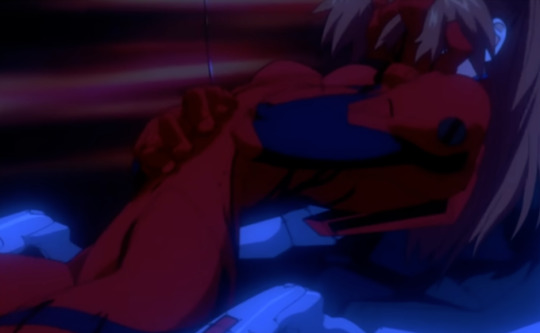
Asuka took a chance.
She opened her heart...
...and she got hurt all because she opened herself.
XVI. Unit 01+MPE Gorging Sequences
The brutality of both Unit-01 and the Mass Production Evas holds three layers: of visual horror, implied horror, and thematic horror. Unit-01, after taking Zeruel’s s2 engine into herself, proceeds to then brutalize the 14th angel by way of still gorging on it. The feeding was entirely recreational considering Evangelions don’t subsist on food to function. This was more about the sheer act of brutality for brutality’ sake.
The Mass Production Evas also fall under this category, the way in which they deal with Asuka after incapacitating her with a replicated Lance of Longinus is also sadistic and gratuitous. They also proceed to gorge on Asuka, her fate made worse through the simple fact that her sync rate is heightened.

The MPEs don’t even swiftly finish her off. She is in a state of tremendous and unimaginable pain. They fly above her slowly, circling above her mangled Eva.
They are almost mocking her as she can do nothing, save for writhe. Asuka’s seething, repeated “I’ll kill you...I’ll kill you….” is then silenced by the MPEs spearing her down.
The brutality doesn’t end there, as we see much darker implications of the damage sustained toward the end of the first half of End of Evangelion.
Shinji bears witness to the implications after seeing the decimated remains of Unit-02 being carried off by some of the Mass Production Units. The sickening reality of it all dawns on him and he is once more exposed to the woes of war and the nightmarish aspect tied of the Evangelions.
XVII. Ancient Ruins of Arqa
We’re ending the pre-abyssal end of the iceberg with Evangelion’s original proposal.
Eva’s proposal, a far cry to the show today, had a more sci-fi angle to it. Psychological concepts weren’t exactly pitched nor was it self-aware. The angels weren’t even referred to as the angels, but as the Apostolos. Instead of the 18 we were presented with in the original show and the movies, there were 28 Apostolos.
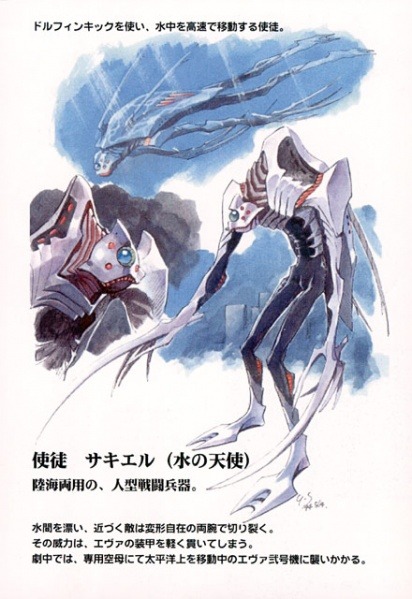
The Apostolos designs stand as testament to how far of a departure the proposal was to the final cut. They look far more menacing than the more amorphous, much softer defined, beady-eyed angels we’re used to. To top it all off, the Apostolos were the de facto villains of Evangelion’s prototype pitch. The Apostolos in the Proposal, toward the end, proceed their onslaught as a group rather than the series’ one by one. Toward the series’ end, the 12 strongest Apostolos begin their assault on North America, annihilating the continent in its entirety.
Only 12 of the creatures laid waste to a singular continent.
Episode 24: "Now, the Promised Time"
Rei breaks down. Her secrets are revealed. At last awakened, the twelve strongest Apostolos descend from the Moon. Both Eva Unit-06 and the American continent vanish completely. Humans acknowledge their helplessness in the face of the Apostolos' crushing power. The promised time, when people will return to nothing, approaches. A human drama in the depths of despair.
Episode 25: "Arqa, the Promised Land"
The laboratory holds the ancient ruins of Arqa, which have become key. In order to stop the twelve Apostolos, the United Nations' head members annul the Human Instrumentality Project and resolve to destroy the Apostolos. Shinji's father objects. Shinji and the others stay at the laboratory for Rei. A drama of people conflicting over incongruous objectives.
https://wiki.evageeks.org/Resources:Neon_Genesis_Evangelion_Proposal_(Translation)
The aforesaid creatures were so powerful in the original pitch that Human Instrumentality and the ancient ruins of Arqa would be the way of stopping the onslaught.
Tier 5: The Abyss

XVIII. Split Second Misato Death
XIX. Humans Are The Villains in Eva
XX. The Ultimate Paradox
XVIII. Split Second Misato Death
As the last and most explicit aspect of original Evangelion, it would only make sense that EoE specific content would take its place in Tier 5. End of Evangelion is a 90 + minute tour de force with disturbing imagery back-to-back. Split Second Misato Death refers to one of the most unsettling images sprinkled all throughout the movie. Here are a few of the many examples of EoE’s building up on Evangelion’s ugliest parts.
Everyone cites the infamous hospital scene not even 5 minutes into the film as the first proof, but user power-chords has pointed out, Shinji has actually attempted suicide (refer to the ‘Free Will v. Determinism’ part of the iceberg.)
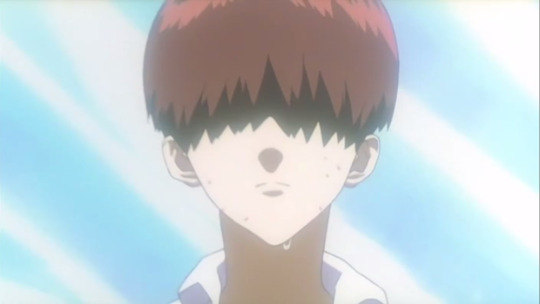
After Misato is mortally wounded and sends Shinji off in an elevator not long after, the JSSDF blow up that part of NERV. A few people have pointed out the most disturbing facet of this scene: through freeze-framing that you can actually see Misato’s body during.
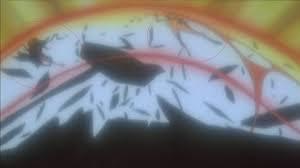
The JSSDF scene partway through End of Evangelion in which NERV personnel are summarily annihilated.
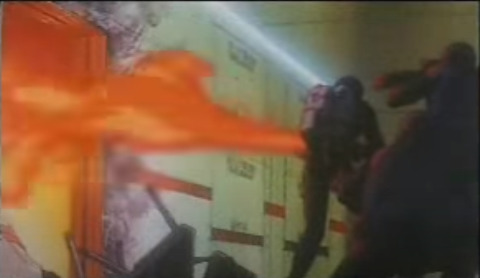
For those missing the small detail of Shinji’s attempted suicide ,Shinji’s depressed state is made more clear when the JSSDF locate him. When they do they attempt to kill him execution style. Shinji doesn’t move.
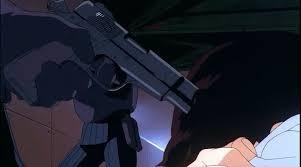
“I don’t want to die…!” during the JSSDF’s assault, Asuka is awoken from comatose state. She is protected by her mother via an AT-Field by Unit-02. She gains back her self-preservation after this realization, and multitude of images play. One of them is an extremely gruesome close-up of Asuka’s face. (extreme body horror warning, proceed with caution)
The Komm Susser Tod scene beginning with Shinji strangling Asuka in harsh coloring, Naoko’s same action toward Rei plays right after. A few disturbing child drawings follow after, predominantly featuring death. (seizure warning, body horror warning)
End of Evangelion’s flooring nature comes from the fact that it builds up on the subtly horrific and makes these terrors explicit. Whatever existed beyond closed doors becomes now available for us to see,
XVIII. Humans Are The Villains in Eva
At the penultimate point of the abyss lies a horror as old as much of time. Of the humane being more disgusting than the monsters.
That we can be monstrous.
This fact becomes known with the appearance of the JSSDF as dispatched by SEELE, methodically mowing down NERV personnel with little to no weaponry of their own. We’re treated to NERV’s personnel in their hallways, some forced with the moral dilemma of leaving their own to die while surviving or helping their own while both end up being gunned down.
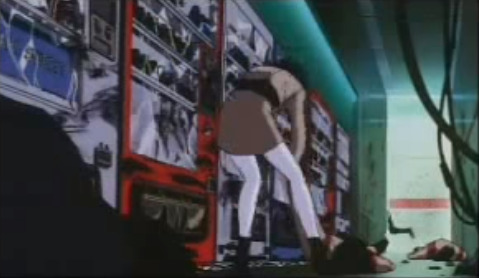
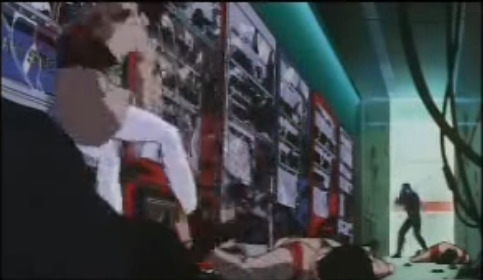
It becomes apparent that SEELE has been gradually, intentionally chipping away at NERV’s Defense Budget, getting rid of the (little) competition they have after the defeat of the Last Messenger.
There’s a degree of contempt and casual sadism that comes with how they kill the personnel. In one instance, a NERV worker surrenders to the JSSDF, before being killed off in execution style in the distance (one headshot plus two extra shots for good measure).
When you look back at it, this sort of sheer, unabashed brutality wasn’t felt about the angels. Human attitude about the angels is largely fearing, anxious. This attitude accentuated itself through a sometimes nervous soundscape. Of observing these weird, ghastly creatures as they creep and swim. And the feeling’s mutual. The problem is that we don’t know.
But here? We do know.
When the JSSDF move in, the anxiety of angels graduates to the full-force dread of creatures that have killed before. The greatest enemy to humanity has always been with them all along, forcing them to a catch-22. The dread falls on Maya because she understands this perfectly. NERV has only ever shot at targets rather than living flesh…
...and SEELE knows this.
SEELE’s slow, but sure suppression of NERV’s budget is kicking a man while he’s down, but the man in question is a child instead. The JSSDF have more than enough firepower, calling it overkill goes beyond an understatement.
The JSSDF demonstrate the lack of remorse further with the discovery of Third Child, Shinji Ikari. One of the members presses the barrel to Shinji’s head before Misato steps in and kills the members.
The JSSDF isn’t the only damning evidence of how ugly members of humanity can be, however.
Humanity’s on-occasion grossness shows itself in small ways throughout the series, in dislike and conscious emotional distance for individuals, or beliefs of the angels being unintelligent and/or savage. Other times it manifests fiscally, in orchestrating more ethical approaches to stopping certain destruction to go seemingly haywire in order for NERV to receive more funding. This all due to a rival company of NERV challenging the very idea for its usage of child soldiers.

The worst of this damning fact is that many of the morally repugnant members exist on a higher echelon of society. There are Gendos running around, doing as they so please and they’re the tip of their echelon iceberg.
XIX. The Ultimate Paradox of Evangelion
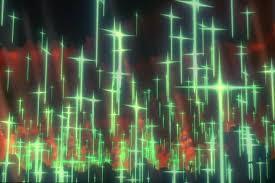
“Anywhere can be paradise as long as you have the will to live.”
We’re treated to these words as Shinji finds himself on shores surrounded by an isolate hellscape, with Asuka next to him. The strange and altogether horrific nature of End of Evangelion has gotten fans believing on End of Evangelion’s endgame was in certain, nihilistic. But Eva dipping its hand in the likelihood of meaning in the existentially meaningless isn’t even the ultimate terror of Eva’s self-aware universe, nor is it the tendency for man to become contemptible towards itself.
Evangelion greatest terror is the paradoxical nature of free will.
Yui’s words to her son as she drifts off into the ever-expanding cosmos, her status as a deity realized, is that paradise is universal. EoE assumes this unconventionally positive approach to a whole series worth of characters’ woes. The issue is: finding paradise is ultimately conditional.
Free Will’s paradoxical nature is what gives credence to the ongoing Free Will vs. Determinism dilemma. People can use their free will to take away yours entirely and this is most evident with Rei. Her existence is the result of a man’s unhealthy attachment to his wife, her lack of self-preservation the result of being conditioned as a multi-purpose vessel; her desire to merge with Lilith to become an omnipresent mother-figure was not hers. The nature of disallowing free will exists on a spectrum, as people can use their free will not to take away the whole of others’ freedoms, but to disallow them proper emotional growth. The adults around Asuka weren’t around for her during the series, leading to her eventual downfall.
Unit-01, throughout much of the second part of EoE holds the power to give or deny people’s physicality due to her status of having both Fruits of Life (the s2 engine held by angels) and Wisdom (from the Lance of Longinus merged with the Eva earlier on). This gives Unit-01 her deity status and while within Lilith-Rei, Shinji realizes that not everyone would be there in his life, that he can’t be in the center of others’ lives. It’s for that reason why he denies people’s physicality (“They can all just die.”), which turns people into LCL.
Shinji gives allows people the ability to come back from Instrumentality after realization arises that without other people, there’s no way to tell if Shinji, himself exists or not. Kaworu and Rei also give him the reality that with people back, pain will become an inevitability once more. With all the souls gathered by Lilith-Rei, they are released after her death.
With the souls of those cast into Instrumentality dispersed, those turned into LCL now hold the ability to come back from Instrumentality if they so choose.
While the idea of anywhere being paradise rings true, it’s not entirely satisfying to say that EoE is unconventional in its uplifting message to the viewer. Evangelion is at its core a cautionary tale. It warns the viewer into extensions of empathy and openness that others would properly live. This goes double for those with power. Without that compassion, we’ll have Asukas, Misatos, Ristukos, as well as Reis, those in the world whose downfalls come from emotional absences, neglect, objectification, and forced baggage. We would have Shinjis, those wanting to be at the nexus of others’ importance because they were deprived while young.
Kindness is a powerful thing and the lack of compassion present in all of Eva implicates most everyone. It leads to yet more abusive cycles, with the only thing breaking that cycle being a hand for those in need.
XX. Conclusion
What more can be said over this juggernaut which is a host to a bevvy of darkness? Evangelion is testament that anxieties and horror don’t need to start out as blatantly shocking or visceral to make an impact years down the line. They also don’t need to be out in the open to initially hook you either. You pick up on a few anxieties as well as horrors and you realize deep down, there must be more, which drives many of us to engage in this often times unabashedly dark source material.
Some of us are doing it later in the throes of adolescences, others are doing so well into their 20s, possibly dipping into their 30s. Point is, it draws in a lot of us and for a lot of us, it doesn’t ever let go.
Some of its charm could be chalked to the visceral ways in which characters interact. Even after years of re-watches, I’m still learning new things about the child soldiers, and I’m quite sure there’s others finding small details. There’s also the possibility of Eva’s approach to terror. I think Evangelion “humanized” its horror. It didn’t make horror a universally human feeling, but made it so that the true big bads looking to cause apocalypse weren’t actually the eldritch. Many of the angels are more or less lost kids looking for their mother (I still think Ramiel’s “singing” in episode 5 was it calling for its mother!).
With those newer details after 20+ years, there will be more added to the iceberg. Hell, there should be more added to the iceberg. This iceberg is the tip of an even greater iceberg. I’m still learning about their adults and their desires as well, how cyclical their actions are. For others, the draw-in factor lies in its low budget. Personally, it’s all of these for me: the low budget helped cement these darker aspects of the series due to horror and the genre’s overall relationship with limitation. It works best on limitation and had Eva worked with a much higher budget, I don’t think the content would be as effective, or perhaps it’d be much more difficult to make it so.
Evangelion is such a well-done, deceptively compact series that each lens a fan assumes has its own interesting rabbit hole. Your circumstance shapes the experience, and this too involves how you navigate the series’ menagerie of terrors.
I’d also like to thank the reader for getting through the largest rabbit hole in Evangelion. I’d also like to thank you for getting through the whole of this meta from a fan who slowly began to resonate with the characters as the years went on!
#neon genesis evangelion#shinji#kaworu#asuka#rei#seizure warning#body horror warning#suicide mention#correct me if im wrong#credit goes to twitter user decoratedboar for the iceberg picture help#and fixes
3K notes
·
View notes